#so its a twist for the characters but its foreshadowed/established fact for the audience
Explore tagged Tumblr posts
Text
Privy
WRITERS
If you see this, spoil your WIP's biggest plot twist using ONLY ONE WORD
Here's mine!
Dying
#im not really one for plot twists. sudden reveals dont really do it for me so i try not to write them (unless its for a really good gag).#instead i either foreshadow everything to hell and back or present things as they come#or like. dramatic irony.#so its a twist for the characters but its foreshadowed/established fact for the audience#but yeah this is a twist i only very recently (like in the last few weeks) decided to include in a fic thats been over a year in the making#i can only think of two other true twists ive plotted out#but both of those are for fics ive barely even plotted out EXCEPT FOR the twists (and wont/shouldnt fully write for a long long time)
6K notes
·
View notes
Text
I think we all had a pretty good idea going into the sequel trilogy that the writers were going to kill at least one of the principle characters from the original trilogy, but you could also definitely tell Han Solo was gonna bite it in the first movie for sure. Han Solo walks out into a black, cavernous room onto a long bridge with no railings to try to talk to his genocidal kid dressed in all black and everything including aforementioned son’s lightsaber is or is lit with red. We know how this is going to end.
Movie and tv show playwrights loooove shock value twist endings and in the past 20 years or so it’s almost gotten to be THE thing they bank on getting audiences in for (which is why I think the idea of ‘spoiler culture’ has been taken to the extreme it has) even when they don’t help/actively hinder the story, and it’s why so many writers have changed the trajectories of stories midway through because the audience, in between movies or episodes or seasons of shows, figures out where the story headed, and they didn’t want the audience to have figured it out sooner than its reveal, so they throw a wrench into what might have been carefully structured and successfully foreshadowed stories, just so they can still get a surprise or twist or reveal in. It’s why a lot of “plot twists” nowadays don’t make thematic or emotional sense in the story, or they’re inconsistent with tone or pacing, and we end up with disjointed and disappointing movies and shows as a whole.
I digress. My point is that even though we kind of had an idea that they would kill off a/some beloved character/s in the sequel movies, there are ways it could have been done better and ACTUALLY shocked the audience, while maintaining a cohesive story. In the movie it looks like Han’s death was there to say to the protagonists and the audience that this villain is willing to kill his own father in cold blood, so there’s nothing he won’t do or sacrifice to achieve his goals (despite the fact we as the audience already saw him blow up multiple planets so like. we weren’t under the impression he had all that much internal conflict in doing so). I don’t remember Han being brought up in the next movie, so it doesn’t appear like his death had much of an impact on the characters’ choices moving forward. (If there was, oh well, it’s not relevant to this post)
The overarching storyline for the sequels (and I do admit I’ve still only seen the first two, I know several pieces of the third through Tumblr osmosis but I just didn’t like or care about the other two enough to watch the third) is centered around Kylo Ren as a villain. Great, we have our bad guy. Problem is, none of the main trio have any significant tie to the main bad guy with the exception of Finn, a stormtrooper who defects when he sees what it is he’s fighting for. With that setup, Finn should have been the main character. (Everyone knows this, it’s been debated and argued to death, that isn’t the point of this post)
The problems came in when the writers ALSO wanted to include the original main cast as principle characters, because those characters had STRONGER ties to Kylo Ren than Finn or the others. You can’t always have two sets of protagonists and tell a meaningful story with all of them when attention is being drawn so many different ways and you’re trying to cram so many characters arcs and dynamics into just three movies. Unless you’ve established a framed narrative, or an ensemble cast from the beginning à la Ocean’s Eleven style, it’s usually not going to work out.
There are already a trillion and one different takes on the Finn-Poe-Rey trio and Kylo Ren’s story. They’re irrelevant to this post BECAUSE
If they really wanted to shock the audience with an established, beloved character’s death, they should have nixed the new trio entirely and kept the focus on the older trio like it appeared they wanted to and they could have explored the story and connections they had to this new antagonist. Then you can really get into some meaningful character dynamics based on history and set up the audience’s nostalgia for the movies and characters they loved as a kid, but still have new circumstances for them to operate under. (Again, this is if you’re wanting to tell a story with the old characters anyway instead of trying something new.)
Ignore the whole First Order and whatever bigger plot was happening in the movies and set it up to be a different story entirely; I don’t care what it is, it’ll exist as the result or extension of the new emotional plot. Kylo Ren is still the villain but this time Han Solo is the main character.
In this universe Han and Leia didn’t split because of his wandering ways or whatever, Han stayed with her because the whole culmination of his character in the first trilogy was becoming the guy who sticks around, and who does so not just for himself or the individuals he cares about but for the greater good, even when the going gets tough. Han Solo was not a good guy— He became the good guy. In this universe that extended to staying with Leia and raising a family because he did choose to settle down.
We follow Han as he tries to track down and redeem his son, bring him back to the light (and how interesting could it have been to see a non-Force-sensitive person redeem a Sith? For it to be the inverse of the first trilogy, with a father trying to appeal to his son?), and the whole movie focuses on the strained relationship Leia, Han, and Luke have with Kylo Ren, in addition to the now-strained relationships between the three of them.
Kylo Ren doesn’t want to be redeemed. He wants to make people hurt, and he especially wants the people he believes failed him or are trying to appeal to him to hurt.
To that end we come to the catalyst for the final showdown. This time, however, Kylo Ren doesn’t kill Han.
He kills Chewbacca.
That is the kind of plot twist audiences wouldn’t have seen coming, the kind that would unite all of them and inspire outrage against the villain (and make it more compelling if he truly does get a better character arc in coming back to the light) because the villain has done something unthinkable, and it leaves the story and characters open to evolve in more meaningful ways because of all the people the villain could have killed it was the one they (and audiences) weren’t expecting to be a target. The injustice of it all.
The original trio were older, and they’re human. The audience knew they at some point in the Star Wars universe were going to die, but Chewie? Chewie’s over two-hundred years old. Chewie’s always been there. Han is almost never separated from Chewie, the one we know has been through thick and thin with him for longer than Han’s kid has been alive.
Han has to reckon with the fact his son has killed his best friend, and that his son did it specifically to hurt Han as much as he possibly could in that moment. Han Solo reached out knowing he could be hurt in the process, but Kylo Ren wanted his father to suffer, and with killing Chewie— someone who was almost certainly present nearly the entirety of Ben Solo’s upbringing— Han Solo is forced to live with and experience the grief as a result, and he now has to figure out what he actually wants in the next movie.
Does he still love his son enough to forgive him for this? Is his son still worth saving? Is he even the same person? Does Han even want to save him at this point? What will Luke and Leia think if he doesn’t? Was Ben only trying to hurt him, or did he do it as a means of challenging Han by saying “Who have you prioritized in your life?” Did he somehow neglect his son to the point this could all be his fault, or was Ben Solo always going to make the choices he did despite the good upbringing he had? Is there anybody who can appeal to this Sith, knowing his purpose is to hurt people by making them suffer the loss of those closest to them? You as the hero may be willing to sacrifice your own life, but are you prepared to sacrifice the lives of others on the gamble that you might redeem one truly evil person, in the hope that doing so will prevent the deaths of trillions of others?
How far are any of them willing to go to try to save Ben Solo from the Dark side, and at what point would they admit or consider him a lost cause?
If you want a true plot twist, make it the death of a character the people within the story aren’t expecting either. Force your main characters to develop based on that twist, and the ripple effects it has will have a stronger impact.
#Star wars sequel trilogy#Han Solo#Kylo Ren#Ben Solo#Leia Organa#Chewbacca#Luke Skywalker#like. tangentially lol#Star Wars AU#hounds speaks#sequel trilogy#my writing#Would Harrison Ford have done it? doubtful#Is speculation still fun? undoubtedly
17 notes
·
View notes
Text


Caturday Reviews: Shadow and Bone by Leigh Bardugo
Though this series has been out for over 10 years and even has a Netflix adaptation, my review below will be spoiler-free. The version on my Storygraph page will have a brief spoiler mentioned.
★ᯓ 4.75 Stars ᯓ★
finished reading: mar. 12, 2025 favorite character: Genya. I loved her in Six of Crows, and I love her now. least favorite character: It's hard because Bardugo writes characters so well, but maybe Mal. I know this is probably a blasphemous opinion, but I don't think he treated Alina fairly. favorite line: "I saw it, as clearly as if I had been standing at its edge: the abyss. Ceaseless, black, and yawning, the unending emptiness of a life lived too long." In a less serious vein, this line reminded me of my beloved partner: "I wasn't about to let some tyrannical redhead push me around."
A YA fantasy set in Bardugo's highly-popular Grishaverse, Shadow and Bone establishes the setting and the series by following Alina Starkov, an ordinary cartographer's apprentice who discovers she has legendary powers. Immediately whisked away by the Darkling, the leader of her country's army of other Grisha (both like and unlike her), Alina finds herself dropped into an unfamiliar and dangerous world she must learn to navigate if she has any hope of saving her country.
From the beginning, the setting Bardugo crafts is intricate and engaging. The country of Ravka is split in two by an otherworldly break in the earth known as the Shadow Fold, a huge swath of land covered in complete darkness and seething with eerie creatures called volcra who viciously hunt any human within its boundaries. Ravkans can only trade with the rest of the world by crossing the Shadow Fold; the implications of this alone are fascinating, and the political and social climate of the country are built logically around this fact, among others.
When Alina and her regiment enter the Shadow Fold, the scene is described terrifyingly well. I'm rarely scared by a book, but this one does it, multiple times. Even beyond the Shadow Fold, Bardugo craftily takes the reader along the highs and lows of the story, whether or not you enjoy the ride.
Coming to this story in the reverse order - by reading the newer Six of Crows duology beforehand - was really interesting. I imagine those who read Shadow and Bone first feel similarly about reading Six of Crows after. Between the books, between the series, there are so many little details that carry over and spark interest and questions in the reader, as further testament to Bardugo's worldbuilding.
The huge plot twist in the middle of the book truly surprised me. Not in a way that feels like it came out of left field and doesn't make any sense, but in the way that Bardugo knew the expectations the reader would have, played into them, then twisted everything the other direction. It even took a few more chapters for me to truly believe the betrayal I was reading. In hindsight, there were so many signs and bits of extremely subtle foreshadowing, which is how such a shocking twist didn't feel as subconsciously wrong as it could have. Reading back through my annotations to write this review, seeing my ignorance, was truly painful. This book is a masterclass in knowing your audience, and using that knowledge to wound them deeply.
As always, Bardugo's characterization is top-notch, and the book is full of witty banter and realistic relationships between the characters. It's hard not to love or appreciate every semi-major character based solely on how real they fell, how textured they are. That being said, I found the characterization of the main character, Alina, disappointingly flat. In my opinion, it can be very difficult to develop characters from a first-person perspective; especially coming to this story from Six of Crows, I think Bardugo may have struggled with this as well, though not nearly as much as other authors/books with similar issues. · · ─ ·𖥸· ─ · ·
I am very excited to read the next book, Siege and Storm, and had to stop myself from checking it out immediately. I have way too many other books waiting for me right now. But believe me, when my queue thins out, Siege and Storm will be next on the list.
#lokasreviews#caturday#jackie#booklr#book blog#book review#shadow and bone#grishaverse#ya books#fantasy
2 notes
·
View notes
Text
In honor of May the Fourth, I'm going to rant about something that has been sitting in my brain rent-free for years.
Ok, so, Count Dooku, right? Qui-Gon's master, ex-jedi, dastardly villain, love him to bits, played by one of my favorite actors (RIP Sir Christopher Lee).
As he's introduced to the audience, we get the villain first, with hints that he wasn't always so. Turning from the Jedi and siding with the Sith in order to destroy the Republic, he's almost a twisted mirror to Anakin himself. The problem I have here, is that we never see his pre-villain self! Oh, it's mentioned in passing by Mace Windu, a character the audience isn't exactly primed to trust either, given his attitude in episode one. And then it's mentioned again by Dooku himself, which is entirely undermined by the fact that we just saw him moustache-twirling barely a few minutes ago! As it is, all the audience sees is "this is a dastardly villain, played by The Dastardly Villain Actor, clearly nothing he says can be trusted."
Show-don't-tell is basic narrative construction, so I think his impact as a character, particularly as a sort of proto-Vader, would be much greater if Dooku were introduced in Episode 1, rather than Episode 2. With that in mind, I have envisioned four scenes, two of which have a speaking role for Dooku and are thus notably longer than the original movie scenes, the other two being either one or two lines longer, or having no change in dialogue, only a visual tweak.
Scene 1) Coruscant, the Jedi Temple. After the initial briefing to the council, Obi-Wan argues with Qui-Gon about following the code. Dooku enters the conversation jovially, having come to catch up with his old Padawan. He asks in jest to Obi-Wan why Qui-Gon would ever want to be on the council, after all, speaking from experience, it's a thankless job and lacking in intelligent conversation. He mentions hearing about the Naboo mission. Qui-Gon informs him of the Queen's hopes for intervention from the Senate. Dooku seems skeptical of her success. He remarks that if the Republic keeps failing to protect its systems, they will take matters into their own hands.
What does it accomplish? Dooku is a friendly figure, one that stands with Qui-Gon and reinforces his viewpoint. The scene builds onto Qui-Gon's dissent with the council, and establishes that he is not alone in his opinions. His remarks about Naboo act as both short-term and long-term foreshadowing: short-term for Amidala's decision to kick the Trade Federation out herself, and long-term for the conflict with the Separatist movement which forms the bulk of the plot of the next two movies.
Scene 2) The council has announced that they will not accept Anakin for training. Dooku strides in, as we have established he does not respect the council, and calls them out. What do they plan to do with the boy? Turn him out on the streets of Coruscant? Send him back to slavery on Tatooine? Missing one's family and fearing a new environment are not moral failings. Dooku points out that he himself was old enough to remember his mother, old enough to miss her terribly, and yet he still dedicated himself to the Jedi, became a master, even sat on the council. He pointedly asks Yoda "am I such a disappointment to you?" Several councilors exchange glances. Mace dismisses them from the room.
What does it accomplish? Dooku is established as a voice of reason, and as a mirror to Anakin. He now has a firm connection to Anakin, as an authority figure besides Qui-Gon who has advocated for him. Anakin may even remember him as a major reason for him eventually being accepted for training. Perhaps he remembers this when Dooku cuts off his hand ten years later. Perhaps this event runs through his mind as he holds crossed sabers to Dooku's throat on Grievous's flagship. One more betrayal to drive him over the precipice to the Dark Side.
The next two scenes aren't doing nearly as much heavy lifting, but I think they're still important for setting up the next movie.
Scene 3) Obi-Wan is speaking to Yoda after Qui-Gon's death. He is now adamant that Anakin will be trained as per Qui-Gon's last wishes. He remarks that if the Council won't knight him, then he'll appeal to Dooku to train Anakin. Yoda sighs and says that Anakin will be Obi-Wan's apprentice. He then mournfully admits that Dooku has left the Jedi Order.
What does it accomplish? We see that even though Dooku and Yoda clashed, Yoda was still sad to see him leave. We see that Jedi can leave the Order peacefully. We see that Obi-Wan trusted Dooku enough that he was ready to turn to him for help. This will make Obi-Wan's discovery of Dooku at the head of the Separatist movement into much more of an emotional moment, a gut punch to see the man he trusted betray everything he stood for. Obi-Wan's cold rejection of Dooku in prison is more than just stubborn distrust, it's bitterness.
Scene 4) Qui-Gon's funeral on Naboo. Dooku attends, standing side by side with his former comrades. Even if he has turned his back on the order, Qui-Gon was still his Padawan, and he will pay his last respects. Yoda and Mace discuss the sith. The camera does its ominous pan to Palpatine in the foreground, then shifts focus briefly to the background, where Dooku stands nearby.
This scene mainly serves as setup, establishing a connection between Dooku and Palpatine. Both of these men will be important in later films, and the movie wants you to know it. In character, Dooku is not only saying goodbye to Qui-Gon, he's also saying goodbye to his former life as a Jedi. In a way, it is his funeral as well.
All of these scenes combined mean that when the audience goes to watch episode 2, they are already familiar with Dooku. His first appearance on Geonosis is not one of "oh, hey, Christopher Lee, wonder what kind of dastardly schemes his character will cook up." Instead, we have reactions of either "wait, but we like this guy! He was on Anakin and Qui-Gon's side last movie! What happened?!" Or at least, for the savvier audience, a vindicated "I knew he would turn out to be evil, it's Christopher Lee!" Either way, the investment is already there, so when he dies at the beginning of the next movie, it actually carries some fucking weight. For anyone who didn't watch the 2D animated Clone Wars series, Dooku was introduced at the end of the one movie, and died almost immediately in the next movie. He's a one note aristocratic english villain who's only job is to be an evil bastard and die like a punk. Not exactly compelling, is it? Certainly not worthy of the acting chops of Sir Christopher fucking Lee.
#thinky thoughts#i appreciate the star wars eu#star wars tcw#star wars legends#star wars#can you tell that my favorite clone wars era novel is Yoda: Dark Rendezvous?#flipping fantastic book#excellent characterization for both Yoda and Dooku#delves into the troubled relationship Dooku has with the Jedi#very much establishes him as a proto-Vader#I think I'm gonna go reread it#may the fourth be with you
4 notes
·
View notes
Text
PART 1 of 6 of the Owl Deity Hooty Theory
[NEXT PART]
[OWL DEITY HOOTY THEORY MASTERPOST] (in development)
(TLDR at bottom of post)
Over several long months of research and analysis since March of 2020, I have been following an utterly fascinating thread of potential misdirection and subtle details throughout The Owl House, and today, I would like to start weaving together of what I believe could become one of the biggest and most cleverly disguised twists in the entire show.
To begin, let’s take a look at the B plot of Understanding Willow:
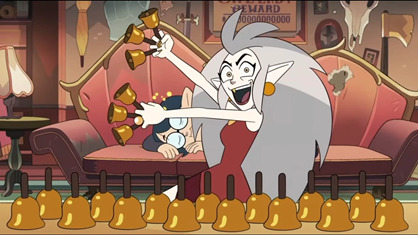
On first glance, it’s an ultimately inconsequential sidestory with the sole purpose of justifying an excuse to keep Luz and Amity in Willow’s mind, as well as providing some well-needed room to breathe and release tension after the veryemotionally charged confrontation with Inner Willow. After half an episode of Eda and King outdoing the other in ridiculous ways to win Gus’ vote and Gus running off in frustration at the end of the episode from Hooty’s inane rambling, it’s easy to laugh off Gus’ pick and assume that nothing/of value was said when he closed the door for the interview.
However, if one pays close attention to that very scene, Hooty actually canstill be heard (if faintly) underneath Eda and King’s grumbling, interestingly talking about how “It all started with a hunt. Blood red skies. That’s right, I was created-.”
Now, while it may seem silly to focus on dialogue from Hooty of all characters, this A) tells us that there was an event in the past involving blood red skies and a hunt of some kind, B) that Hooty had been created close to said event, and C) implies that what he knows but can’t tell as a story worth a damn is EXTREMELY important to be included and be hidden in such a manner.
For comparison, the only other instance of dialogue being tucked away in the background in the entire show is in Wing It Like Witches:
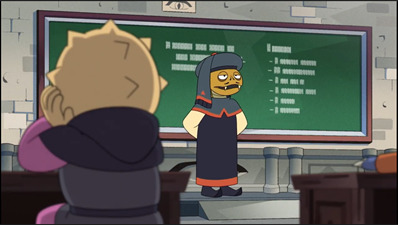
During the lecture at the beginning of the episode, the history teacher openswith lore on Belos appointing a head witch to each coven over 50 years ago, immediately cluing in the audience to try and decipher the rest of the lecture as it moves to the background. Adding to this is how the musical sting when Luz shows off her movie obscures what he says even further, making it even more of a intriguing puzzle that the creators clearly intended for viewers to pick up on and attempt to solve.
In contrast, the hidden dialogue of Hooty’s interview is much shorter and not as hard to decipher as the teacher’s history lesson, but at the same time, there are few to no indicators whatsoever in that scene to clue in the audience to even check for something like that. It comes at the end of an episode where most viewers would have been paradoxically tired out and driven abuzz by the revelations of Amity and Willow’s relationship, doesn’t attempt to draw much attention to itself, and frames itself as a comedic subversion of audience expectations with neither the “greatest witch who ever lived” or the self-proclaimed king of demons being picked by Gus.
Instead, he picks someone that the show portrays constantly as an oblivious and gullible idiot after being described as a “state of the art defense system” at the very beginning of the series. Someone who, despite it being played for laughs, is scarily capable of casually subduing Lilith offscreen one episode and then beating her and an entire squad of Emperor’s Coven members without even the slightest change in personality or temperament.
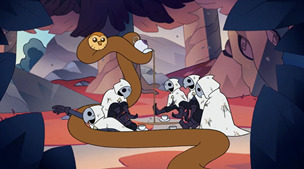
Someone who, due to being the Owl House itself, could be considered the titular character of the entire show, yet is taken for granted by those who inhabit him and barely gets any respect from even the cutely patronized King - including when Hooty could be interpreted as having potentially been full on DEAD for a time given the use of extremely cartoony X eyes and a lack of vital signs in The Intruder.

And someone who Eda at best tolerates and at worst abandons in personal interactions and only occasionally acknowledges him when he’s actually doing his job. Yet at the same time is so implicitly trusted beyondprotecting her home to the point where - when up against the closest person Eda has to an equal outside of likely Belos - the only actually recognizable spells Eda used in combat were 1) stereotypical energy blasts, 2) a single shield spell in Covention, and 3) a noticeably large reliance on imitations of Hooty above any other spells she could have decided to use instead.
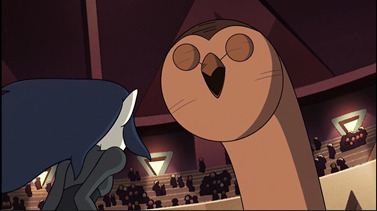
In short, the show repeatedly tells us he is just an idiotic gag character through and through, but at the same time demonstrates he has immense power through both onscreen and offscreen demonstrations, implicitly tells us his importance ahead of time through Eda’s imitations in actually serious situations, and treats his interview and origin story as - if not even more- important to keep secret than a long lore dump about how Belos’ reign works.
After all, there being only two instances of hidden background dialogue in the entire season is already intriguing on its own, but for one to get plenty of clues to draw in people’s attention and for the other to be treated as just another gag about a “mere comic relief character” - aka a good way to draw away attention and lower one’s guard - heavily suggests a far deeper significance buried under layers of misdirection, comedy, and conditioned audience expectations.
I mean, when Eda bragged about being “a bad girl living in a secret fortress,” Hooty followed with a remark about how “I’m the secret.” While that line may sound like Hooty simply being confused as part of a one-off on the surface, it’s an odd dialogue choice for the writers to pick when you think about all the other reminders of his nature as the house itself throughout the season. With the precedent these moments set, it would have been much more appropriate for him to latch onto the “fortress” side of “secret fortress” AND it would have been just as equally funny of a joke about his awareness skills, but instead, Hooty broke away from the established trend to say something that would make people suspicious were it to come from anyone else.
In a way, this reminds me much of the many subtle bits of foreshadowing strewn across the show, like Luz unknowingly describing Amity in Witches Before Wizards and Eda burning a hole through Luz’s coven type quiz that coincidentally selected the same track she had taken at Hexside as “a punky potionist.” At the time of airing, these initially seemed like one-off jokes, but eventually came back in full force several episodes later with Amity’s hidden sensitive feelings and love for the Azura books becoming clear in Lost in Language, and the reveal of Eda’s school track in Something Ventured, Someone Framed with her school misdemeanor pictures.
That said, compared to these individual bits of minor foreshadowing, the jokes about Hooty in Understanding Willow appear to simply be the most obvious pieces in a giant puzzle, implicitly and outright telling attentive viewers that there’s a major mystery to be uncovered here.
In fact, I feel bold enough to say that we could be looking at a twist on a similar scale to that of the Pink Diamond/Rose Quartz and Stanford Pines twists in Steven Universe and Gravity Falls respectively, what with this particular puzzle piece coming from how Gus wanted to make THE greatest interview of all time, and how he was looking for someone who was “interesting, accomplished, AND noteworthy:”
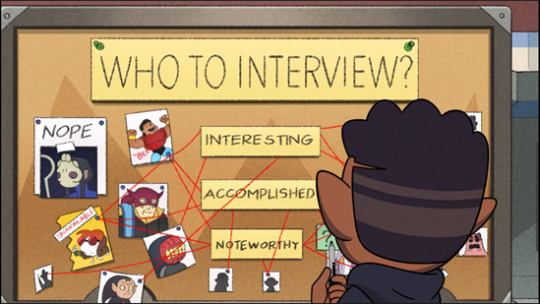
Note the emphasis on the ‘and’ here, as Gus had made a big deal that “people aren’t meantto be all those things” at the beginning of the episode, so as a result, stripping away all the comedic framing of his subplot leaves the intriguing implication that whoever - and, perhaps, what- Hooty is, they really are the most interesting, accomplished, AND noteworthy person out of everyone.
I could go further and talk about why I suspect the mystery surrounding King’s origins, whether true or not, is partially meant to misdirect us from paying attention to Hooty, or how the TOH crew’s could be disguising legitimate clues to his nature among made up and highly meme-able joke answers in order to proliferate said concepts throughout the fandom - thus letting us do all the dirty work of getting ourselves used to the ideas and used to dismissing them at the same time - but to bring things to a close for now, I’d like to leave you all with a question that I’ll start answering next time:
What does it mean when both the most powerful and notorious witch on the Boiling Isles and the possible actual king of demons/the Titan itself/something don’t match up to a house? And what do you think it is that makes him so special to warrant such misdirection?
TLDR: Between Eda’s golem spells, the show stressing his nature as the titular house, his implicit strength, and the odd dialogue and structure of Understanding Willow‘s subplot in relation to him, I believe I have good reason to suspect the show has been giving us many hints towards Hooty being much, much more important than it would like us to currently believe or even joke about. Particularly, through clever uses of comedy to establish and enforce a strong audience bias against looking closely at him or unironically taking him seriously, and to potentially plant the seeds for something I will start exploring in Part 2.
#the owl house#the owl house theory#owl house theory#the owl house speculation#toh theory#the owl house hooty#toh speculation#owl deity hooty theory#long post
265 notes
·
View notes
Text
a reluctant goodbye to YIIK: A Postmodern RPG
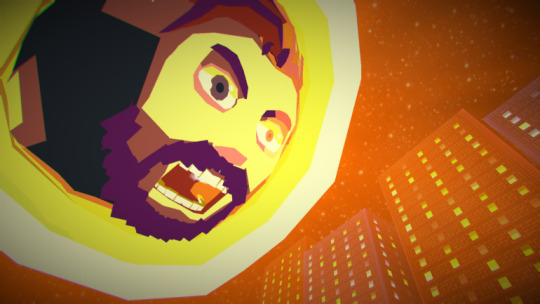
note: this was originally written on 01/17/2022
YIIK: A Postmodern RPG sports a unique reputation. the public opinion of the game is irreparably fucked, but few people actually took the time to play it. it is in the spectrum of works that are so big in scope and fail so spectacularly that it forms a hole of discourse around it that attracts even people that wouldn’t even wanna touch it if it was considered good.
an interesting quirk of YIIK is that it is not an unfinished game. it’s done and presumably fulfilled the artistic ambitions of Ackk Studios, the team behind it. it’s a flawed premise executed badly, and every aspect of it got discussed to the ends of the earth. it’s a confusing game, and a wordy one at that.
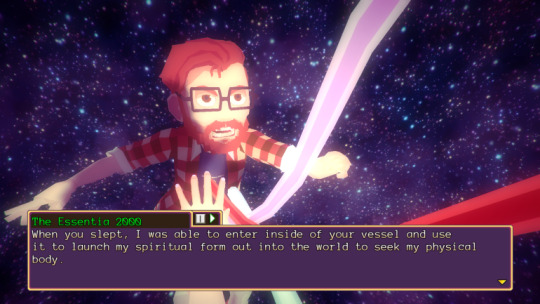
it drops and picks up new plot points incessantly at will, and is very happy to send the player into hours-long detours only to introduce some new characters and make you play through a boring cave dungeon. it goes to massive lengths to gaslight you to make a dumb plot twist work, and it shamelessly drags out its Paper Mario-inspired combat minigames to make battles take 10 minutes each, but still, i cannot say that i hate YIIK.
it may be a bad game, but it’s hardly boring. i couldn’t look away from the disaster in front of me. i devoured the whole 15 hours that it gave me in a weekend. i can’t say any game this interesting is not worthwhile.
the writing is just so interesting. all characters share a bit of a hive-mind mentality between themselves to different degrees, which i can only explain as the writer letting way too much of himself into the story. and it doesn’t help that it is very easy to see where that disconnection in the characters begins and ends.
basically every time someone starts a philosophical monologue you can just assume that is the case. for example, when Michael dumps his whole backstory while getting into a big anecdote about his cousin’s supernatural experiences, he lets out the same personality quirks as Alex in his long rants. when a character does this, the other characters who are listening turn into pace-breaking audience surrogates that just ask convenient questions that let the main speaker continue the monologue. in the example i gave Alex takes that role (and that really does not fit his established character, if you can even call it that).
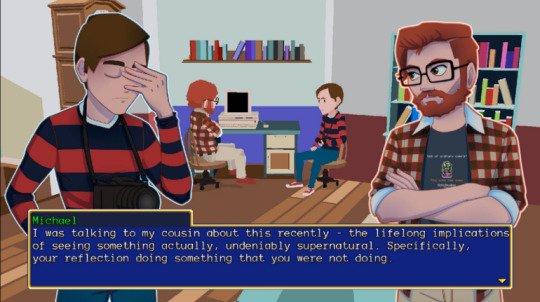
and that makes for some very unpredictable writing. YIIK starts talking about hundreds of things, but it quickly forgets about them before even leaving the “dictionary definition” part of the discussion. some may find this insufferable, but it can be amusing in a way. it’s like taking a thorough look into what can go wrong with the stream of consciousness writing if not edited appropriately, with some passionate and dramatic voice acting going along with it.
it even surprises you from time to time. some of the later themes that YIIK wants to get into were in fact foreshadowed in a lot of the dialogue that came before, but the game gets into so much unrelated shit up to that point that it comes as a genuine shock.
the writing in YIIK is just insane like that. very uniquely insane. but it doesn’t even comprise most of the game, because sometimes, you hardly get any dialogue for hours at a time (but mostly in the mid-game). when it does this, it’s time for dungeons!
and they suck. most of the dungeons are overly long, unnecessarily confusing, blend together, and are painfully linear. it’s bad in a very similar way to the writing, which makes for an unexpectedly consistent experience.
even the dungeons that try to be different and not only slightly decorated corridors end up being linear, and even overall worse than the most straightforward ones. Vella’s mind dungeon is a clear example of this. it consists of the main hub with like 10 doors, each leading you into a linear trek through enemies and some puzzles. the thing is, a lot of these doors can only be cleared when you have some stuff that you can get in the orders, so if you didn’t luck out and went into the correct orders you need to constantly go back and forth through them to finish it. and the areas they hold aren’t that small. it’s just a more convoluted and boring way to do things. it sucks.
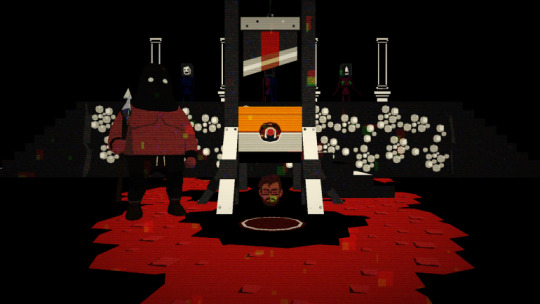
but, again, these dungeons can be interesting, even knowing that battles each take 10x more time to beat than they should (and that dungeons are littered with them!). they serve as big changes of pace that give you uninterrupted hours that you can use to chew the plot that was given to you.
there are even good games that do this, like Pathologic. in that game, in between all of the heavy dialogue riddled with decision-making, you take long walks that never become dull. you are always thinking about what you just experienced, and planning out ahead. in YIIK, it’s just like that, except you try to understand what the fuck the game was trying to say.
everything in this game tries to stretch to reach somewhere but only gets caught up in itself, and in the end, i felt a bit empty finishing it. i mean, the ending is perplexing as it is, but i did get the same empty feeling i get when i finish any RPG, where i have to say goodbye to that world.
so yeah, i do think that YIIK is a worthwhile game. but i still have something to talk about regarding it. just when i finished it, i received the news that this whole article would become irrelevant really quick.
recently, the game’s developers announced YIIK I.V., a big (and free!) update that will radically change many aspects of the game, including the whole combat and leveling systems (which are my biggest gripes with it). but well, i just finished the game. not the I.V., just the normal game. and i wish more people got the opportunity to play it as it is right now.

mind you, I.V. is not the first time YIIK gets an update. my own playthrough had some decently-sized patches applied that changed cutscenes and nerfed/buffed some skills and bosses, but it wasn’t anywhere close to the scope of what’s promised to change in I.V.
but you know, i just want the original game to be preserved in some way. i’m sure that the story will still be batshit insane when the game gets changed, and that many of its plot points will still be at the same time over and underexplained, but the tightly maddening original experience will still be lost to time.
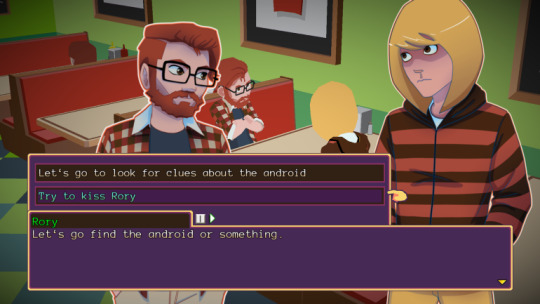
ok, so let me explain what i mean by this drivel. with the large-scale normalization of patches as tools for developers that came to be as a consequence of online services and overall better internet, a lot of the original 1.0 versions of countless games (especially ones without physical releases) are being left only in the hands of piracy sites, many of which could go offline at any moment.
the historical shitshow of Cyberpunk 2077’s 1.0, the empty wastelands of No Man Sky’s 1.0, and all of the other underwhelming releases that were heavily patched later (and that’s not counting MMOs!). all of these are already inaccessible through normal means, and while you technically can access them with a physical version of the games (and only while setting the console to offline), this is still a major hurdle to go through, and will only get harder and harder to access as the years go by and the games physical copies go up in price.
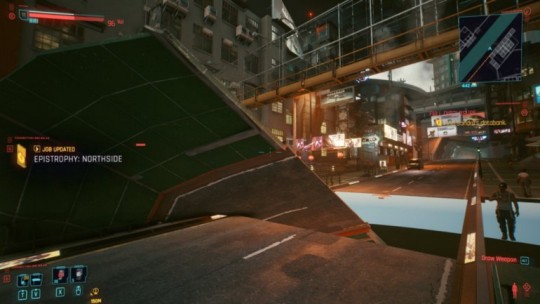
what i’m talking about here is that even though these are just straight-up worse versions of the game, i still want them to exist. they are often more interesting than the newer, fixed(ier) versions, and are important for early historical preservation of the still brand new medium of video games. a lot of old games were already lost to time, but what about the infinite amount of different versions of the same game nowadays? i’m not saying that every version should be kept, but man, at least the first one could be preserved.
but yeah, what i’m asking for here will most likely never happen, and i understand why. no developer or publisher would like to give players a broken or worse version of their game, and that’s why in the few cases that you can easily and officially play older versions (like with Minecraft), they are still functional builds with no rough edges aside from having less content.
so, with that big aside (wow, just like the huge tangents in YIIK, how clever!!!), i want to get into why i chose YIIK to be the focus of this piece. with the examples i gave before, the games were missing content in the case of No Man’s Sky or completely broken in the case of Cyberpunk 2077, but YIIK is different.
the old version that got discussed to hell and back is complete. it had a couple of bugs, but nothing major like with Cyberpunk. and it’s not missing content because there’s a lot of shit in this game. sometimes too much for its own good even.
like i said at the beginning, YIIK as it stands before the I.V. update is a complete rendition of a vision (even if it doesn’t completely match the expectations of its developers) and it gives any player that chooses to engage with it a lot to chew on, even if it’s all horrible.
what if the update removes the honestly iconic line shown below?
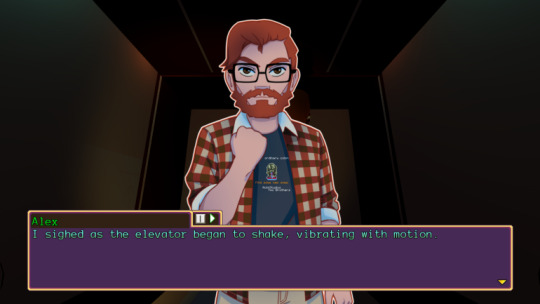
what if fixes the slog that is your first visit to Wind Town, where the combat first shows its ugly and repetitive face? what about the combat itself?
YIIK’s old version will only legally be available through the countless videos talking about it. a lot of those videos are pretty cool, but people who see that won’t be able to play it like that anymore.
but still, it’s not like i want YIIK to be bad forever. i wish the best for the studio with the I.V. update i want it to be good. i want the developers to close their chapter with this game that they’ve been working on for almost a decade and then move on to something new, but i also believe that bad games deserve love too!
also, i acknowledge that this isn’t the end of the world. i just wanted a way to encapsulate my feelings about the game while also talking about game preservation, an aspect of the medium that i also think should be talked about more, even if it’s more abstractly like i just did. anyway, thank u for reading! ^-^
9 notes
·
View notes
Text
Yes, it's nearly 2.00am (because that's apparently the only time I have inspiration to write essays) but I've been thinking a lot about this lately and wanted to get it off my chest, so here you go:
The main goal of Merlin becomes disturbingly fractured along the way, which opens up the gaps for the prophecy to seep through instead of following the expected channels, but it can essentially be boiled down to three key elements 1) build albion; 2) decriminalise magic and 3) save Arthur, but when all is said and done, we never really see any of those objectives achieved.
Now, there are a few reasons for this, both from a writing perspective and a plot perspective. The first, and one of the most obvious, is that this show loves irony. I won't go into a lot of detail here because I've already written a whole ass essay in this very subject, but in a nutshell, you can look at this from two perspectives: firstly, it's important to establish that this technique is purely about the angst: it's the writers' way of provoking a reaction from an anguished audience, but it's foreshadowed just enough to make it more painful than it is shocking. Alternatively, there is the more plot motivated irony in that it genuinely makes a good story. Irony is a technique that has been used for thousands of years, not just because it provokes a reaction from the audience, but because it allows you to explore your characters in greater detail than before, riddling them with hidden juxtapositions and internal conflicts that are never resolved quite in the way you expect. The irony in Merlin is the epitome of this, with the whole motif of Arthur needing to die for his reign to begin. It is a classic example of the simultaneous despair and hope that mocks you from the shadows.
Following this, there is another force at play that deals with half truths and seemingly imperfect contradictions, and that's prophecy. It's not really a secret that I have very strong feelings about prophecy and its effects on all the characters, Merlin in particular, and the fact that fate and destiny are such key themes in Merlin both makes perfect sense and wants me to smash my head into a brick wall. Prophecies are another common trope that often go hand in hand with irony (think Oedipus Rex, Macbeth, The Iliad, all that doomed hero shit that I inexplicably adore), the key to their influence over the plot often lying in how they usually come true in the most unexpected of ways. This links back to that initial theme of irony, but this isn't what makes me angry: what is infuriating is that prophecies tend to come true, no matter what, and most of the characters seem not only to know this, but to let it take their autonomy over their respective fates, driving them to disaster.
Let me elaborate: especially in season five (I'm assuming just for the added fall at the end), Merlin talks a lot about how "one day, things will be different". He tells sorcerers that one day they won't have to hide. That one day, they won't have to live in fear of who they are and what others think of them. And Merlin is right: while it is not explicitly stated, it's generally established that this is one of the things Merlin should actively be working towards. But here's the kick: except for a few specific circumstances, when has Merlin ever actively tried to change Arthur's mind about magic? Yes, he has taken a few opportunities, like with Dragoon saving Uther's life, or with the Dolma's final request, where he has encouraged Arthur to rethink his choices, but otherwise, his support has been lukewarm at best. Instead, his primary concern was always saving Arthur, so he can become the king the magical world hoped he'd be, but he left out a crucial part, trusting in the prophecy to fill in the gaps. He knew it would come true, but it was, almost predictably, in the one way he never dared to expect.
And in a twisted way, there's that thread of irony again: Merlin thought he was saving Arthur so he could one day become the king who would see magic as a force for good, but instead, he created someone who was merely a survivor. It was Kilgharrah who said it first, and he who would mention it last: they are two sides of the same coin. But as willing as Merlin was to give his life for Arthur, and vice versa, he was never really ready to give him his mind.
Another interesting thing to note is Merlin's fixation on the "Saving Arthur" lens of the prophecy over the "Restoring Magic" part. Now, there are a ton of ways you can look at this, depending on how far along the scale of Queer Analysis you are, so I'm going to try and address a couple. At one end of the scale, you have the fairly simple and very believable "merthur" take. This basically boils down to the fact that Merlin and Arthur may or may not be deeply in love with one another, and that drowns out any voice of reason that may unfold. This is actually fairly canon compliant, particularly looking at incidents such as the Disir, when Merlin chooses Arthur over his and his people's freedom, though that choice was clearly, in hindsight, misadvised.
At the other end of the spectrum, there is the idea that it is the work of Kilgharrah, Gaius and other responsible figures in Merlin's life when he was new to his role in destiny, who reiterated at every occasion that Arthur must be protected at all costs. This may have ingrained into Merlin's thoughts and influenced his decisions from here on out.
Between those two points, there is a grey area, and I am of the personal opinion that neither extreme entirely satisfies the situation. For me, I think the characters in question are far too complex to have such simple motivations, and that the true reason lies somewhere between the two: Merlin undoubtedly cares for Arthur, and while at the start, his actions in protacting Arthur may have been driven by other (largely superficial) motives, over time, their mutual affection blossomed to the point where certainly the more personal quests were motivated not by need, but by love. However, there is a divide here, and while the line in the sand smudges from time to time, it never really disappears: a lot of instances in which Merlin is trying to help Arthur are entirely overshadowed by destiny, and in time, Merlin comes to accept that Arthur and Destiny are, in fact, one and the same, and this is where that ever-present tragedy lies. For all he truth in here, Merlin doesn't get everything quite right: he sees Arthur as a balance that needs to be protected, without fully realising that he doesn't just have to keep the sides of his equation in equilibrium, but he actually has to start solving them if he wants them to endure.
Having just said all that, sometimes I decide to fuck over complexity for a few hours purely because I am a shameless merthur hoe.
Also, can you take a moment to please note that this last section is highly subjective and it is completely up to you as to what you decide!! This is just my opinion and you're welcome to agree or disagree at any point.
So, aside from the Angst Factor™ and twisted character development, why was the main goal never fulfilled? Unfortunately, that is a question far cleverer people than me can only speculate, as the writers alone know the answers, but I'm going to give my opinion a shot. Honestly, there is something beautifullly poetic about something that never ends, or ends when there could be something more. Humanity has struggled with endings-and beginnings- since it learned truly how to think, because that kind of finality, that inkling that there might have been nothing before and after something else is incomprehensible. In leaving Merlin in a place where the next point was uncertain, the writers left the story open for us. In depriving us of that catharsis, they effectively made sure that the story would never be over, not until we want it to be. And yes, it was painful. I can't think of an ending that was more heartbreaking than that curious mixture of closures and openings all at the same time (hell, I could write a whole essay based on this concept alone!), but it was also a gift, ironically like that of the prophecy itself in that we can choose what we want to do with it, safe in the knowledge that there will be a happy ending again, one day.
In summary, we might not be left with catharsis in the way we wanted. We might not have got the happy ending that could also have stretched on and on indefinitely. But we were left with something else, something equally beautiful as closure, but in the complete opposite way. Amongst the remains of allwe had hoped to build, Merlin left us hope.
#sorry for the inevitable ineloquence here i am absolutely knackered#bbc merlin#merlin#merthur#i'm going to regret this in the morning
58 notes
·
View notes
Text
The Foreigner: Review
I recently saw The Foreigner and in my opinion it’s one of the better films on Netflix.
Watching this film was a decent experience, the acting was considerably believable in most instances and Jackie Chan was excellent, not only as his grieving character but with his self-performed stunts and combat scenes (even at 63 years old he moves like he’s 30 or something, its wild). Each action set piece is positively tense, with a certain palpable brutality and weight to each physical impact. There are enough twists and turns in the plot that can easily keep you guessing and the character backstories are pretty interesting to say the least, especially Jackie Chan’s, (I’m just going to call him Jackie Chan throughout this review because his name in the film isn’t incredibly memorable to be honest.) his particular story is appropriately emotional and quite considerably heart-breaking and you absolutely believe his character and the things he’s capable of, after seeing flashbacks to what he’s had to endure and live through.
The film gets off to a good start by establishing Jackie Chan’s character (Mr. Quan) as an overprotective (but rightfully so) father when we, as the audience are introduced to him and his daughter Fan (Katie Leung). Their short rapport prior to the tragic incident that befalls them, shows his concern for her safety and in such a small period of time, we see him giving her a number of cautionary instructions for even the most trivial of tasks, such as; meeting her prom date or getting out of the car before he’s had a chance to park it appropriately.
Visually, the entire film is very well shot, however there isn’t really a standout scene that really highlights the work of the cinematographer, but the camera direction and editing is still solid for the most part. The scenes that require handheld camera work don’t feel overdone, (as is the case for a lot of films that make use of the shaky-cam technique) which in turn, brings a certain clarity to what could otherwise be kind of catastrophic. The bigger moments in this film, I believe, successfully capture the impact necessary for a story such as this. The opening explosion definitively sets the tone for the rest of the action filled scenes found throughout the rest of the story and the effect itself, is arguably aesthetically flawless in its presentation alone. The sound design in this same scene certainly deserves acknowledgment also, because of the sheer ferocity conveyed by the diegetic blast and the way in which the cataclysmic effects play out on-screen. However, though this scene is quite effective for what it is, I ca t help but be reminded of the term ‘Fridged’ in relation to the plot. The concept of someone (usually female) we haven’t spent a lot of time with but are told is important to the main character, being killed in an awful way to kickstart the main character’s goal; mainly vengeance or justice for what happened to the aforementioned female relative or love interest.
Although the initial scenario driving Jackie Chan’s scheme is kind of distasteful as character motivation, the following few scenes do their best to visualise a believable broken bond between him and his last remaining family member. Obviously, most of the heavy lifting for scenes such as this falls to Jackie Chan, and I feel in moments like this is where his range is predominant and absolutely incredibly showcased. Chan easily captures the tortured and pained expressions and mannerisms found in a grieving father, the powerful emotional moments in this film are all accredited to him and he does them absolute justice in my opinion. In all honesty this may be one of his best ever performances, and this singular role gives him the space to really exercise a different side to his acting persona that most people may not be used to. His deadpan delivery and demeanour are extremely functional for a sombre role like this and the screenplay it encompasses.in general though, regarding the performances in this film, Jackie Chan and Pierce Brosnan stand above the rest; their characters’ back and forth across the span of this film paired with some incredible scenes of action definitely carries an otherwise average storyline.
I personally think everyone in this film is doing an incredibly solid job in their respective roles, each actor turns in an extremely believable performance, although there is some overused and tired dialogue being used in one of the climactic sequences (you’ll know exactly what I’m talking about when you see it and hear it for yourself) the actors and actresses involved still deliver the lines in a credible fashion.
The plot is understandably simple yet, at the same time offers a higher complexity than most of the other productions Netflix has to offer. An appropriate amount of build-up is placed before each major plot reveal and on multiple viewings there is considerable foreshadowing regarding the identity of the specific bomber actually responsible for the blast that killed Jackie Chan’s daughter.
However, there is a somewhat unnecessary sub-plot that entails Pierce Brosnan’s nephew having an affair with his wife; this here doesn’t need to be in the film because it literally doesn’t affect anything at all. (Pierce Brosnan’s character finds out and literally doesn’t have a reaction other than mild disappointment and disgust at the fact that it’s his nephew that committed the deed.)
The end of the film does actually feel pretty satisfying though, all things considered. It successfully remains interesting without resorting to over-the-top instances of destruction, like in a lot of other films nowadays. So overall, I give it a solid 7 out of 10.
1 note
·
View note
Text
The two mentalities that, in my opinion, lead to the death of good story telling.
‘Cliches and tropes are to be avoided at all costs because being predictable makes us boring’, versus ‘We need to stick to the tested and safe formulas because that’s what’s popular and makes money’. Fight!
Ironically, these both come from the desire of attracting and entertaining a massive audience... but they both try to do so in really lazy ways. The former misunderstands why cliches are cliche. There was a time when any story cliche would’ve been novel and popular, and in fact they became so popular that now everyone knows them, hence, they are ‘cliche’. They aren’t necessarily bad, and they aren’t the death of your story-- you just need to know how to properly implement them. They work better with some stories than with others.
Meanwhile, the latter mindset is to blame for all the big blockbuster series and the remakes and shit. This stuff is SAFE. Filmmakers know that these things already possess a pre-existing fanbase that they can get money from, and by copying the tried-and-true formula of the original, people will come and give them said money, even if it’s just to complain about how the remake is worse than the original.
So honestly, my only advice is-- fuck it. Don’t think too hard about EITHER of these mindsets, don’t think about cliches, don’t think about originality. My least favorite writing advice are the ones that go on about ‘oh, you HAVE to avoid cliches’ and ‘oh, you have to MURDER YOUR FAVORITE PLOT POINTS’
Don’t worry about predictability OR shocking your audience. WORRY ABOUT CREATING AN INTERNALLY CONSISTENT WORLD AND STORY. Paying attention to that is what will bring you a satisfying and cathartic ending.
As and example-- the Bifrost Incident by the Mechanisms. It’s a tragedy, yes. We are set up from the start to KNOW that this will be a tragedy, because it’s investigating the mystery of ‘why did the Ratatosk express crash, what happened to its passengers.’
It gives us a really fantastic twist that seems to come out of nowhere, that it was Lovecraftian eldritch abominations that crashed the train, and gives a tragedy wider in scale than anyone expected! But upon subsequent re-listens, it becomes apparent that this was already internally consistent with what had been established. That much of Odin’s dialogue foreshadowed this twist, and in addition, the fallout of this twist is properly explored rather than moving on to the next shock value thing.
Worry about the motivations and character arcs first. Does it make sense for this character to do this thing? Why does the character do what they do? What theme or message does my story send? What sort of ending is most satisfying?
The rest will form itself around that.
Keep in mind, this is mostly just me rambling around what I believe works best in a story meant to provoke emotion. Every individual IS different, what works for me will not work for everyone. You can’t please every individual-- but some things do work better than others, seeing how, as I pointed out, cliches WERE popular enough to become cliches. In addition, if you’re just writing plotless fluff, smut, or whump, you don’t need to worry about this either. Those things cater to a specific niche and tend to be rather self-contained, and I do enjoy a good whumpfest myself. This was just inspired by my thinking about a few specific poorly-written series praised for a few shock-value deaths and ill-thought-out messages. I’m aware I will probably come off as pompous to some, for that reason.
#basically just rambling#some will probably guess what may have inspired this#but meh#don't worry about it if you can't guess
4 notes
·
View notes
Text
Danganronpa V3 Commentary: Part 6.7
Be aware that this is not a blind playthrough! This will contain spoilers for the entire game, regardless of the part of the game I’m commenting on. A major focus of this commentary is to talk about all of the hints and foreshadowing of events that are going to happen and facts that are going to be revealed in the future of the story. It is emphatically not intended for someone experiencing the game for their first time.
Last time in trial 6, Tsumugi was very clearly just cosplaying Junko despite no-one properly figuring this out for ages, Danganronpa trivia was really not necessary to prove everyone’s memories are fake, Tsumugi kept insisting that Shuichi called this trial because of her backstory when really it has nothing to do with that and everything to do with Kaito, Maki was very distressed to learn even more how she was just being controlled and manipulated like always, Tsumugi was a literal fucking shapeshifter, everyone was more upset than they should have been over Hope’s Peak being fictional for something they’d only known about for two days, but at least that meant that the outside world was…
Well… about that.
Monokuma: “Puhuhu… Forget about the world. It wants nothing to do with you.”
Oh boy. It sure doesn’t, even though it should. Here we fucking go.
…Does anyone have any idea what “kumafarre”, the word plastered all over the trial background from this point on, is meant to mean? Because that’s always stumped me. It has to mean something for them to have put it there. Kuma is bear, obviously, but “farre” can’t be Japanese, so… ???
“first!”
Pfft, of course that’d be the first message to show up. But it also proves that everyone in the audience can see their messages showing up here, so they should know that the characters can see what they’re saying.
“Bring on the spoilers!”
How does this even make sense? You can’t have spoilers for a reality show that’s happening live. The only possible spoiler is who the blackened is during a trial, but we’re way past that now.
“Kyoko is my waifu.”
“Sakura is my muscle waifu.”
“Chiaki #1 waifu”
Ugghh waifu culture. And also, I told you everyone was a bunch of genwunners in this audience! No-one mentions anything like this for any character outside of DR1 or 2. And yeah, obviously seasons past 3 don’t exist in the out-universe, but the out-universe writers could totally have just thrown in some random names we’ve never heard and expect us to assume that they’re talking about unknown characters from other seasons. Fifty other goddamn seasons they could be choosing from! But nope, it’s all gotta be mostly season one with some two, that’s all that counts.
“My husbando Shuichi!!!”
And of course Shuichi gets that shitty treatment too, even though he’s a real goddamn person who never asked to be famous and nobody is entitled to anything from him.
“Wow, Himiko is still alive…”
Seriously, that’s the first thing someone wants to say when their messages are getting displayed in a place where Himiko can see it? Lovely.
“Viewers get to participate now!”
“I feel like I’m participating, too!”
At least these couple of people are currently being fairly reasonable – they’re just excited to be a part of it in some way!
…The first two characters Tsumugi cosplays after this moment are Kyoko and then Sakura, and then Chiaki pretty soon after that. She’s pandering to those people whose messages she saw, isn’t she.
“Sakura”: “Of course, those you see here are only a fraction of our total viewers.”
I. Should. Sincerely. Hope. So. Because that’s the only thing that makes this even remotely believable – the idea that the majority of the fanbase are somewhat more decent human beings than this (you know, aside from the watching real people kill each other thing) and we’re just seeing the vocal asshole minority right now.
…That’s really not what the narrative is going to be going for with this, though. If they actually wanted us to think that this audience we see is just the asshole minority and everyone else is more decent, this topic should get addressed in more than just this one throwaway line, and it is not. So probably the only actual reason this line is here is to establish that the number of viewers is way higher than suggested by just these commenters, and not that the attitude of the rest of them is significantly different.
“I believe in Keebs.”
This is a little early hint to the Keebo deal, since a lot of the audience should be thinking about him the most.
“You can do it, Shuichi!”
I like this person! This person is the most decent and realistic person we’ve heard from so far! Yeah, cheer on Shuichi just like I’ve been doing throughout this commentary! They care about him and want him to succeed! It is of course more twisted in this person’s case because he’s not actually fictional, and becomes even more so now that Shuichi can actually hear them and any pretense that he’s just fictional can’t be maintained, but at least this is otherwise a realistic and relatable response to this.
Shuichi: “W-Wait, why would a peaceful world need a killing game like th—”
“Taka”: “It’s *because* the world is so peaceful that this killing game is necessary!”
“Celeste”: “It is so very peaceful… And so, it is so very boring.”
“Kyoko”: “With so much peace, people have become bored. They need stimulation…”
That’s… kinda bullshit. First Shuichi’s assumption that only a world full of strife could possibly create a reason for a killing game, but then also the idea that peace would make people bored. Humans don’t start wars for entertainment, you know. World peace should be the least boring thing for humanity, because without having to spend so much effort on survival and equality, everyone would have more energy left to make all kinds of technology and art, including entertainment which should not have to involve killing real people to be entertaining!
To be fair, Tsumugi is probably exaggerating somewhat, given that she’s part of Team Danganronpa and is trying to sell the idea that her product is so necessary for the world. But it would seem that we are in a world where one way or another it’s become socially accepted to watch real people kill each other for entertainment… which doesn’t seem like a peaceful utopia at all, really.
“Chiaki”: “Every person in the outside world watching this is a huge Danganronpa fan.”
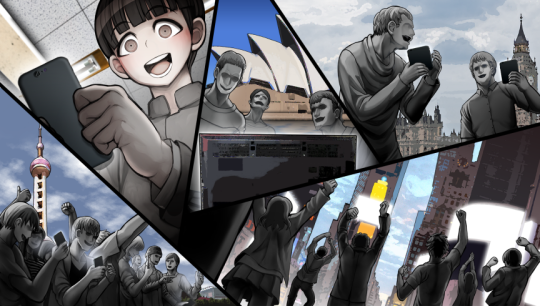
We get a demonstrative image of people all over the world apparently excitedly watching Danganronpa, most of whom are vague and faceless. If it were just them then it could be possible to imagine that Tsumugi is lying and this is just a hypothetical image of what she’s talking about rather than the truth. But… Makoto’s also there. The kid that we, the out-universe audience, very definitely saw at the beginning of the chapter in a context that had no connection to Tsumugi and no reason to be a lie. Which gives this image a lot of credibility.
(And if this is the truth, again, it really doesn’t look like it’s a shady hidden thing only accessed on the darkest corners of the internet.)
I will say one thing in this world’s favour. I’m not remotely trying to defend the part where they watch real people kill each other, but Danganronpa really must be hugely popular among absolutely everyone for this to have somehow ended up not extremely illegal. Which means, given the fact that the audience are basically telling themselves it’s fiction and treating it as such, this is also a world in which it’s socially accepted, not just in niche geek subcultures but in mainstream culture, to get really excited by and invested in fiction. If you took all the awful murderiness out of it and made sure it was all actual fiction, man I’d love to live in that kind of world. As it is, in our world, only children are really socially expected to get super-excited about fictional stories all the time, like it’s something people are meant to grow out of as adults. Among adults, only very few extremely mainstream fictions get even close to that kind of widely-accepted level of importance in people’s lives. Which is disappointing to me.
“Chiaki”: “This killing game is for everyone… So it’s everyone’s killing school semester.”
That’s the Japanese subtitle of this game, which actually turns out to be very meaningful! The general sense of it she’s talking about here would have applied to every season up until now, but there’s also the more specific sense that this season in particular has audience participation, which is apparently the first time it’s happened, making it even more “everyone’s” than before.
And the localisers just decided to nope on that subtitle and change it to the meaningless “Killing Harmony”, which is honestly a shame. Maybe the Japanese subtitle is a bit too long and too much of a mouthful for western standards, but they could have at least changed it to something which kept that relevance.
“Killing Harmony! I just got it! LOL”
Haha, no, that doooeees not work in the localisation.
“I’ve waited three years for this.”
“I thought the franchise was done.”
Huh, this is some juicy info. It’s taken three years since season 52, long enough that some people thought there wasn’t going to be another one? (And a lot of the rest of the chatter at this point is people applauding, perhaps being happy that they got another season.) That… suggests that Danganronpa might have been already on its last legs even before what happens in this trial comes and puts the lid on it all, which maybe makes things a little more believable. That’d also potentially explain why this is the first time they tried the Keebo gimmick, if they were trying to keep things fresh after worrying people would be getting bored of the same old thing.
Also, even if it’s usually less than three years between games, you’ve still got to imagine it’d be at least one year or so, which means it’s been over half a century since the Danganronpa franchise began. A lot of people who worked on it while it was still pure fiction wouldn’t even be alive anymore at this point.
Plus, geez, how long did they keep Rantaro in limbo between games? Was he allowed to live a relatively normal life for the time being while knowing that if they ever did get around to a season 53, he’d be forced into it, meaning he lived dreading that day and desperately hoping it’d never come? Ouch, poor Rantaro. Or possibly they do in fact have real cold sleep technology in this universe and they just stuffed him in one of those for three years.
“Shuichi, look this way! <3”
That’s… rather entitled but also kind of believable as something someone might do, since it seems like a lot of the audience have forgotten that these characters don’t just exist to perform for them.
“Get to the punishment already!”
Aaaand here’s someone who’s barely a believable person. Do the audience really just watch this to see people be horribly executed, rather than for all the character drama that happens in between those parts?
The opening theme music for this game starts playing… and apparently this is being played in-universe, based on the fact that Maki reacts to it.
Maki: “What is this…?”
“Fuyuhiko”: “Can’t you tell? It’s the title of the current Danganronpa you guys are doing.”
God, that has to be incredibly disturbing and wrong, being told that you’re hearing the theme music for you and your friends’ suffering and death… and it’s just this chill jazz tune, of all things. This probably hammered home more than anything else the awful sense that all of their struggles have just been entertainment.
“Chihiro”: “Danganronpa’s gone on so long because the whole world enjoys and supports it.”
No mention of the fact that apparently some people thought there wouldn’t even be a season 53? Of course not, Tsumugi wouldn’t want to admit that the franchise might be on its last legs.
“Makoto”: “What season do you think we’re on? You should be able to tell from the logo.”
So she claims. But you know what I thought when I first heard her say this? Since I already figured it was probably season 53 from Junko the 53rd, I thought the clue in the logo was the negative space between the V and the 3.

It’s actually kinda shaped like a 5 if you look at it that way! But nope, that’d make way more sense that what it’s actually supposed to be.
(I bet Shuichi figured it out from the Junko hint and not the logo, too.)
“V is the Roman numeral for 5.”
*deep breath*
That is not how Roman numerals work!!! In Arabic numerals, “5” can mean five, or fifty, or five hundred, etc, depending on its position within the number. But Roman numerals do not work like that! “V” only ever means five, and its position in the number does not change that. V3 cannot possibly mean fifty-three. It’s combining two number systems that work completely differently and do not make any sense being combined, but if one were to try and make a number out of it, it’d simply mean “five-three”, separately. Or maybe you’d add them together, so it’d mean eight.
In Roman numerals, fifty is denoted with an “L”. To actually get fifty-three in any vaguely sensible way by combining Roman and Arabic numerals, it’d be L3. Or, heck, why don’t we write the whole thing in Roman numerals? Then it’s LIII. Which just so happens to look and sound very similar to the English word “lie”. If the Japanese writers of this game wanted to do a clever little number/letter trick, why didn’t they go for that? It would have been great! Or they could call it L3 but make the negative space between the L and the 3 look kind of like an I somehow, so that “LI3” almost looks like “lie” as well. Missed freaking opportunity there, guys. Instead it’s just very apparent that nobody in Spike Chunsoft (or Team Danganronpa, for that matter) has any idea how Roman numerals work.
“Danganronpa 25 was the best.”
Shout-outs to this person. They’re the only person we ever see here who mentions any series other than 1, 2 or the one they’re currently watching. Props to them for knowing what their favourite season is and sticking to their guns in a sea of people who disregard every new season that comes along as soon as it’s not current any more in favour of obsessing over the first ones like they’re the only ones that matter. Season 25 probably was genuinely one of the best ones if it has a dedicated fan like this. You go, random person. I feel you.
“This is my first Danganronpa.”
Huh, so despite how much Tsumugi is trying to make us think everyone is obsessed with it, there have to still be at least a few people who don’t get what all the hype is about, if this person only just decided to check it out for this season.
(Clearly there hasn’t been a large enough proportion of these uninterested people who are upset about the whole killing-real-people thing to be able to put a stop to it before now, though. Even if it’s not their thing, if the rest of the world’s okay with it then it must be fine, right???)
“I love Shuichi <3”
Yes, thanks, we’re getting that impression. This is probably the same person from before, who still feels the need to mention this while everyone else is talking about this being season 53.
Monokuma: “The seasons just kept coming, and with it came more killing games… Until it transcended games and anime to become this, the Ultimate Real Fiction…”
They gloss over this quite quickly, but it is important to note that yes, the earlier seasons really were just fiction in this universe like they were in ours. They’re not trying to retcon that the Hope’s Peak killing games were actually only happening for entertainment thanks to Flashback Lights and fabricated backstory. DR1 and 2 were completely fictional in this universe, which means that nothing happening here matters to or compromises that storyline at all.
After all, it does make sense that Danganronpa would need to have worldwide popularity already before society collectively decided that doing this with real people (but definitely not really real people, right) would be totally okay. It’s unclear exactly when the transition to “real fiction” happened, although Shuichi and Maki’s comments on the files in his lab kind of made me assume that there were more real ones than fictional ones. So… I was just shouting out season 25, but that one probably involved real people being killed, too.
“Leon”: “What, did the letter in there throw you off? Well, I guess that happens. But isn’t it just rad how it looks like a letter, but it’s really a number!?”
I am way too amused at how they made it be specifically Leon, mister 11037 himself, who mentions this point. Nice one, guys. Nice.
“Sonia”: “Since this is the 53rd season, one would expect to see a multitude of characters…”
Tsumugi: “But you only have memories from the first two, so you wouldn’t recognize any others.”
They shouldn’t even recognise the ones from season two, like I’ve been saying! But she’s been cosplaying them anyway. So it’s probably a lot less about keeping them recognisable for the students here and more just about pandering to those genwunners and twoers outside.
(Obviously there’s a very good out-universe reason for this, but, you know.)
Tsumugi: “So yes, I’m the mastermind! But the *real* mastermind forcing you to do this is… the people of the outside world!”
Way to deflect your responsibility, Tsumugi! Yes, everyone outside is also partially responsible by demanding this and giving it an audience, but you’re still the one who made it all happen and got everyone killed!
The audience starts chattering about how they’re the mastermind, but it’s in a way that sounds happy about it, like they’re just excited to be part of the story. They don’t seem to register the fact that, hey, maybe being literally actually responsible for the suffering and death of the characters they’ve been watching and caring about isn’t actually a good thing.
“Mmm… Shuichi’s nose <3”
Meanwhile Shuichi’s “fan” here still has a one-track mind and is getting increasingly creepy. I refuse to believe that this is the same person who was cheering Shuichi on earlier, since that person actually cared about him and didn’t only shallowly see him as eye-candy.
“put Maki back on kthx”
Also apparently Maki has “fans” too. But hers probably aren’t the good kind either.
“Mikan”: “The ones managing this killing game aren’t psychos like the Remnants of Despair…”
“Ibuki”: “They’re literal managers! Literally!”
Just because they’re managers, that doesn’t stop them from being shitty, evil people on par with the Remnants of Despair in terms of awfulness. They are quite evidently both.
Tsumugi: “So I want to hear your best guess. What company is running this show?”
…
Shuichi: “…Team Danganronpa?”
I love how Shuichi’s tone of voice makes it clear that he’s just pulling this name out of thin air. How is he supposed to know? Conveniently, Team Danganronpa were apparently just really uncreative when it came to naming themselves. (I guess this is realistic enough, though – our world does have The Pokémon Company, which makes Pokémon.)
We – and therefore presumably the students and the in-universe audience – get shown the opening movie that was right at the beginning when you start a new file, the one that summarised seasons 1, 2 and 3 and then implied this one would be a continuation of it. Which still doesn’t actually make any in-universe sense, since all the evidence other than this clearly points towards Hope’s Peak having not being part of this game’s backstory until Tsumugi improvised it in chapter 5. Maybe this was a promo video Team Danganronpa then hastily slapped together after that point to try and act like they totally had this planned all along?
The only difference from before (because it would have been a huuuuge spoiler to see this last time) is that we also see the supposed logos of every Danganronpa season up to 53. 4 through 10 are clearly the out-universe writers having a field day referencing other works of fiction, but then 11 through 52 are all exactly the same logo with only the number being different. Yeah, that’s not how it actually was, is it. The out-universe writers just didn’t want to take the time to make that many unique logos for a split-second each of screentime. (And, fair enough.)
We then get shown a collage of what appears to be basically all of the illustrations in this game. Which you’d think shouldn’t actually exist in-universe, because the audience’s camera is supposed to be Keebo’s eyes, and he wasn’t there for half of this stuff! So this strongly suggests that despite what Tsumugi’s going to claim about that later, the audience could also watch the game through the Nanokumas’ footage instead and potentially saw all the same scenes that we saw that way.
…Makoto is on there, though. He definitely should not be. The out-universe writers didn’t catch that, I guess.
Shuichi: “Shut up… Shut up!”
Yeeeaaah, I don’t blame Shuichi for this. Tsumugi and Monokuma and the audience have been blabbering on for quite a while now, barely letting him and his friends get a word in edgeways while treating them like objects for their amusement. That has to be awful.
And even aside from Shuichi’s feelings about it, the way the audience has been suddenly babbling excitedly about Danganronpa in general to the point of almost completely ignoring the characters who are in this actual story they’re supposed to be invested in is pretty shallow of them. That’s already a sign of how unrealistically awful an audience they’re going to keep showing themselves to be.
Shuichi: “No matter how many false memories we’ve been implanted with, *we* aren’t fictional!”
This line is here as a setup for the big reveal, of course, but even so… he’s right. Just because literally all of their memories from before this killing game are fake, it doesn’t change that they’ve been real people from the moment they got all of those memories.
Shuichi: (Who… are we…?) “We… are real! We’re living, breathing human beings!”
“Nekomaru”: “No! You’re just like MEEEEEE!!!”
I made Shuichi answer this incorrectly at first because I really feel like he would want to assert this… and he’s still not wrong! They are very definitely living and breathing right now, nobody can deny that!
“Makoto”: “You’re just fictional characters created solely for this killing game.”
“Teruteru”: “Nothin’ we can do about it, I’m afraid. Danganronpa’s that kinda property.”
I’m sure it’s much less some intellectual property dispute and more the idea that everyone might have slightly more issue with actual real people from the outside world being killed in this. It’s totally fine if they were created solely for the killing game, though, because then they’re not real and only exist to die here, right?
And honestly… that does make all the deaths in this game come across as just slightly less awful and tragic, in that context. Not because they aren’t still extremely real people who very much did not deserve to suffer and die, but, since they were created to die, anyone managing to survive and escape despite that feels like even more of a victory than in the previous games. It’s less Monokuma killing a bunch of people who were never meant to die, and more Shuichi managing to save at least a small handful of people who were never meant to live.
“Gundham”: “Your immaterial existence is a fabrication, independent of your actual flesh and blood.”
To translate the Gundham-ese: their “souls” were created separately from their bodies. Kind of like how they were discussing when going into the Virtual World how odd it is that the two can be separated like that.
Tsumugi: “Yep, you’re all fictional.”
“Ibuki”: “You guys out there beyond the fourth wall already knew that, right!?”
I like how this works as simultaneously talking to the people beyond both fourth walls at once, while not actually breaking the real one. (Though the people beyond the in-universe fourth wall are only telling themselves these guys are fictional and aren’t actually right.)
Tsumugi: “You all didn’t look like this when you first came to the Ultimate Academy… Those were your true selves. Now you’re all just fictional characters. That’s the truth.”
Shuichi: (That’s the truth? Then… our real identities…)
Don’t get caught up in her manipulation, Shuichi! You are not any less “real” just because different people used to inhabit your bodies!
Tsumugi goes on to talk about when they first arrived at the school as their pregame selves before they got their outfits and memories. And again, we saw this. It is quite ridiculous to assume we saw an entire lengthy section in the prologue which just straight-up didn’t happen. The game has lied to us, but only with very small lies of omission (re: Kaede’s inner monologue). If the game was willing to lie to us about entire sections we played through, we couldn’t trust anything. We couldn’t even trust if this trial we’re playing is really happening right now, or if anything we saw really happened, which would render this entire story meaningless.
“Byakuya”: “But boring, everyday characters have no right to be in Danganronpa…”
Honestly, why, though? Sure, the talents are supposed to be a Danganronpa thing, but you could totally do a killing game with ordinary people. It might make for an interesting change, especially after 53 seasons.
“Peko”: “Which means your Ultimate talents are all just fiction.”
They may have come from fake memories, but they have those talents now. Nobody can deny that Shuichi’s been a pretty great detective.
Maki: “Our talents as well…?”
Maki Roll, you never killed anyone, and you’ll never have to! This is great news for you!
…I bet if Kaito were still here, he’d immediately turn to her with a big grin and tell her that. Encouraging and being happy for the sidekick with a bright side to this would be way more important than however he might be feeling about this revelation in respect to his own talent.
Maki doesn’t react here with anything other than shock and disbelief, though, so I don’t know if this quite sinks in for her yet. It’s probably very hard for her to accept that she suddenly doesn’t deserve to feel guilty about anything. After all, this won’t diminish the effect Maki’s memories have on her and that she’s going to have to live with feeling like she’s killed countless people for the rest of her life. But knowing that nobody real actually died because of her has got to help a lot. I’m sure that’ll sink in eventually, once she’s had more time to think about it without the trial getting in the way.
“Chiaki”: “I mean, they suited you to a certain extent, but mostly in a placebo effect sorta way. Kinda like a form of autosuggestion… You know, like if you do it, it’ll all work out.”
We’ve seen Flashback Lights do plenty of things that aren’t just straight-up remembering stuff: brainwashing everyone to be filled with meaningless “hope” and a sense of the completely wrong meanings of the words “hope” and “despair” in chapter 5? Brainwashing Shuichi into suddenly being a creepy pervert for that optional scene in chapter 3? Kaito’s phobia of ghosts leading him to feel anxious and nauseous upon simply thinking about a certain irrational stimulus? So, given that, it’s not too much of a stretch to imagine they can do this kind of thing too. Heck, most of the talents in this game are things that only require knowledge, and perhaps a certain kind of personality, something Flashback Lights can very evidently do. Some also require muscle memory, which is a bit more of a stretch, but it’s still memory.
The hardest one to buy for me is probably Angie’s talent. There’s some muscle memory and some knowledge involved, but a lot of what makes someone good at art is more intangible and hard to define and might be difficult to encapsulate in a Flashback Light. However, Angie was unique in that she explicitly did not remember creating her art, because Atua was supposedly possessing her, and she had to be alone for that to happen. That’s how she made the waxworks. So it’s possible that what was actually happening was some kind of hypnotic trigger making her pass out when she thinks she’s about to create something, and then the gamemakers put pre-created waxworks in her lab. Remember how Angie made four waxworks without having intended to? Almost as if the gamemakers weren’t sure who she’d choose for the ritual and just made all four in advance. …And, okay, admittedly it’s very unclear how anyone could have got inside the school to put the waxworks there, which is the same question as how a hypothetical clone-with-a-Flashback-Light would have got in for the resurrection thing if that was going to be possible. But there’s something there. (Can you tell I hadn’t thought of this idea until after the commentary for chapter 3 had gone up and so I’m awkwardly fitting it in here instead.)
And ultimately, if the characters being “fictional” is the point of this story the out-universe writers decided to tell, then that always had to include fictional talents as well, since Danganronpa insists on having all its characters be Ultimates. So Flashback Lights have to be able to do this, even if it’s a little bit of a stretch to believe, because it’s just necessary for the premise to work.
It’s a lot like how we had to buy that the Exisal randomly had a voice changer that could perfectly mimic any student’s voice, simply because that was vital for the fifth trial’s premise and that story wouldn’t work if it didn’t. We can’t just use the fact that it was somewhat unrealistic of the Exisal to have a voice changer as any kind of evidence to propose that it actually didn’t.
Another example: I once saw a blind LP of the first Danganronpa game where it got to the memory wipe reveal and Junko handwaved how memory-wipe technology worked. And the LPer was all “Um, no, how is memory wiping even possible? I think it’s pretty important to establish this, actually!”, like he was using the fact that he didn’t understand how to question whether it had even happened at all. But that was missing the point; explaining the technology really wasn’t all that important. The existence of memory-wiping technology was just a necessary part of that story that had to be accepted, because if memory wipes weren’t possible then that story couldn’t have happened. This story is the same, except with Flashback Lights and the multitude of things that they need to be able to do to make this story work. At least in this case, Flashback Lights and some of the things they can do are well-established already, which is better setup than the memory-wipe technology had in DR1.
Tsumugi: “Can you really say you’re not fictional now?”
Yes! Yes, they can and should say that!
“Hajime”: “Even if your body is real, your identities, personalities, talents and past are all fiction.”
Past, sure. Identities… maybe? At least if we’re just talking about legal identity? But their talents are quite evidently still talents now, as I’ve just been saying, and their personalities are also something they’re expressing right here and now. Even if they were deliberately crafted and created to be that way, it doesn’t mean those personalities aren’t now real. You can only call a personality “fake” if that person is knowingly putting on a façade and pretending to be someone they’re not. So the only fictional personality we ever saw was Kokichi’s supposed love for this killing game. …Oh, and Tsumugi’s, of course.
Also, hi, Hajime. It’s fitting that she’d choose him for this. If we’re supposed to believe that Izuru got shoved full of every single talent imaginable by them doing weird brain stuff to him, it’s perfectly reasonable to also believe Flashback Lights could do something similar on a lesser scale. And Izuru’s entire existence was created from that process, but that didn’t make him any less “real” of a person than Hajime was. If anything, it made him more real at that point, because he’d overwritten Hajime completely (at least until the simulation). It’s honestly a very similar thing. Maybe Hajime’s story partially inspired the idea for this game.
Shuichi: “…”
Unfortunately… this seems to be working on Shuichi.
…You want to know what Tsumugi ought to think of as the real reason she killed Kaito? Not to have his death inspire Shuichi to become even stronger. That would still be happening anyway if Kaito were still by his side encouraging him; all that was needed for that final push was for Kaito to admit that Shuichi’s even more of a hero than him and tell him that. The real reason for his death should have been because Kaito would completely annihilate what Tsumugi is trying to do here.
Because the only thing that matters is what you want to believe! Tsumugi is trying to argue that their pasts being fabricated means that they don’t count as “real” people, but who even cares about that? They believe they’re real, and have always believed that, and still want to believe that, so why should anything else matter? Someone like Kaito who puts such value in belief and has such strong, unbreakable convictions about being true to himself wouldn’t be listening to any of this crap. He’d be shaken to learn his memories are all fake and that his grandparents and fellow astronaut trainees don’t exist, sure, but it wouldn’t even scratch his belief in who he is. He’s Kaito Momota, Luminary of the Stars! Who cares if he’s only this way because someone else wanted him to be, it’s still who he wants to be, so it’s who he’s going to keep being, dammit! And, of course, upon seeing that his sidekicks are having trouble with this idea and are starting to doubt if they’re really real, he’d give them just the pep talk they’d need to keep believing in themselves and their own existences.
Kaito is exactly the kind of person who would be able to blow this whole trial out of the water, and nerfing him enough to prevent him from doing that required nothing less than him not being alive any more.
(Meanwhile, if Kokichi were still alive at this point, he’d be his usual infuriating self. “Oh, you guys are only just figuring this out now?”)
Also, if Kaito were still alive in this trial and ultimately ended up surviving and escaping while having learned that his memories are fake and he was never actually an astronaut trainee… you know that would not stop him from striding up to JAXA’s front door and being all “Let me take the astronaut exam, sure you already know I’m too young but you’ve also seen I’ve got exactly what it takes”.
---
[Next post]
9 notes
·
View notes
Text
My Hero Academia Chapter 217 Review
So, it’s been a while since I did a review of this, eh? Yah, sorry. And next week is a hiatus so, lets dive in
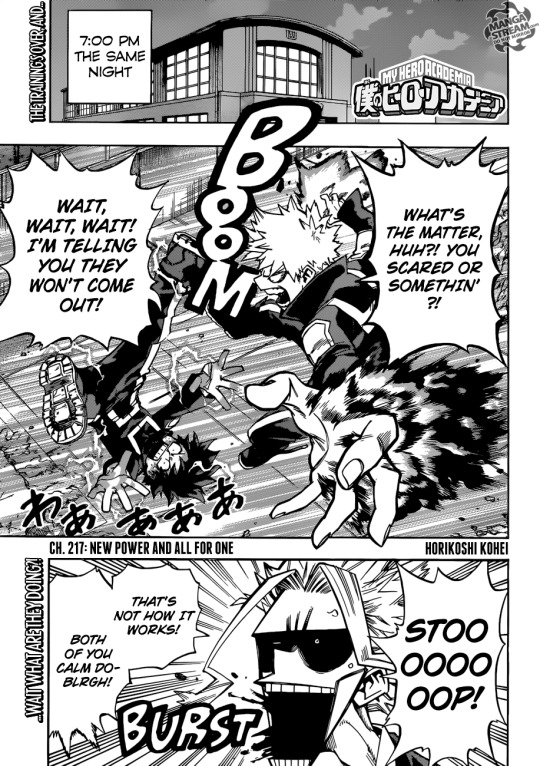
We open up on Bakugou and Deku fighting, well more training. As Bakugou is trying to force the Black Whip to activate. All Might has to tell Bakugou that this is about testing Deku and making sure he doesn’t release the Black Whip unintentionally.
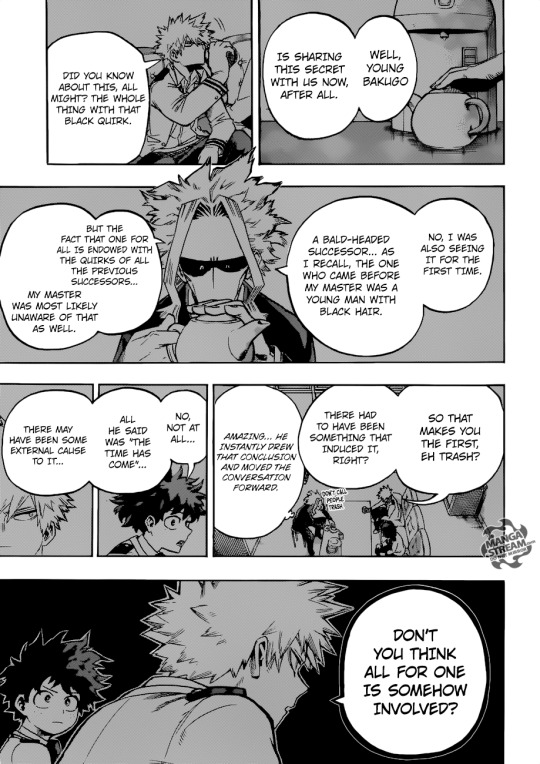
We get a flashback revealing that now that Bakugou is in on the One for All secret, he now gets to be meeting with Deku and All Might. I can’t help but imagine Bakugou being at least a little giddy on the inside considering he now gets to hang out with his favorite hero. Though he’s spending it with Deku so maybe it balances out.
Anyway, we get confirmation here that All Might did not know of these multiple quirks and likely Nana didn’t either. So this makes Deku the first of all the users to complete one for all.
Also, we see Bakugou’s addition this duo’s dynamic, he is master of cutting straight to the point. Already, asking questions to move the conversation forward. And when Deku suggests that this was possibly was caused through external means, Bakugou is the one who suggests that this was thanks to All for One.
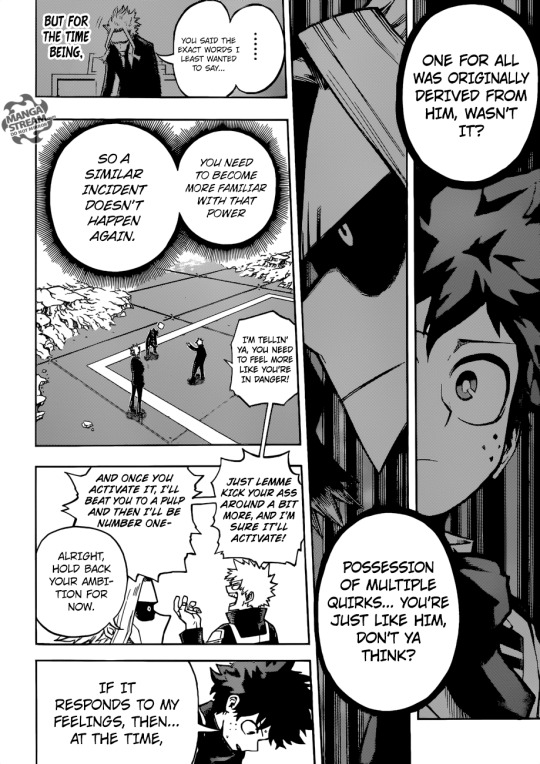
Bakugou compares the quirks of All for One and One for All, as well as being the one who puts forward the fact that the quirk of One for All originated from All for One.
We cut back to the present where Bakugou’s trying to force out the black whip, but All Might needs to reel him back a little. Deku says that the quirk will only activate when with his feelings. My guess is from what the Hell Boy looking guy said, the feeling Deku needs to have to awaken Black Whip isn’t danger, but rather, feeling of grabbing or catching something or something. So maybe we should get Iida and start a chase or something?
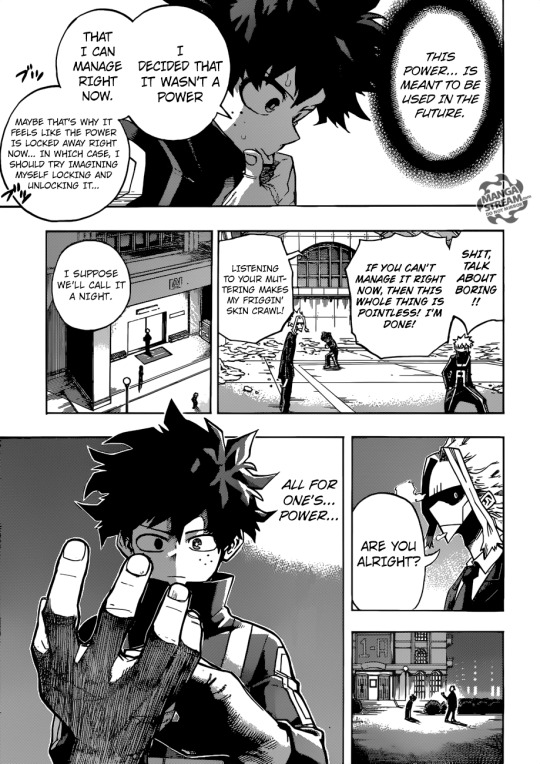
Okay, make up your mind already Hori! Look I appreciate that Horikoshi had seemed to make it out as Deku needed to master the percentage portion of All for One to withstand the physical taxation of quirks like Black Whip. But now it seems like its implying that Deku should start figuring out how to unlock it instead of waiting till the fiiture like he had said 2 weeks ago.
I guess what this could be implying is that Deku should learn what “feeling” activates his other quirk, but he shouldn’t use it until he’s mastered the strength portion of the quirk. Now that would be fine if that were the case. Its also a possibility that this is a transnational issue and I might just be misinterpreting it.
Also, Deku is a little hung up on the comparison to All for One. And likely the fact if this was caused by him, its very likely All for One might be able to do other things to his body.
We cut away to the best part of the chapter.
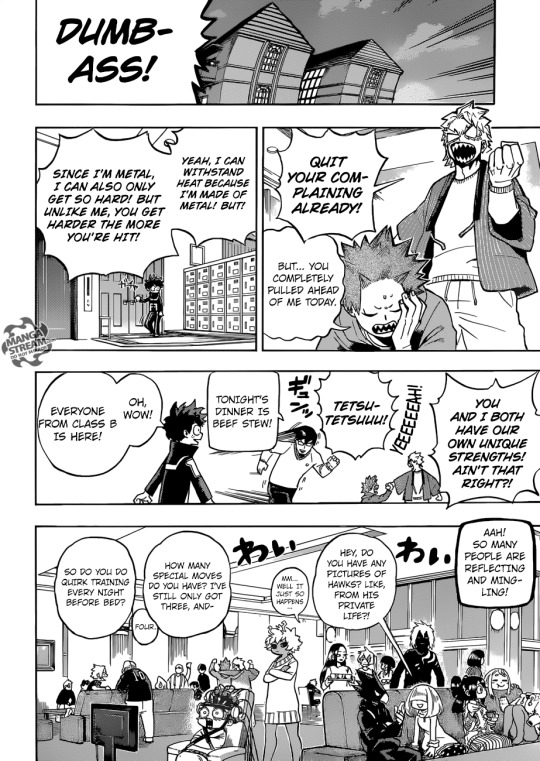
All of class 1-a and class 1-b hanging out and enjoying dinner together.
We see Kirishima and Tetsutetsu discussing quirks, and it highlights what I said about them during the team Todoroki vs team Honenuki fight. That Tetsutetsu and Kirishima, while almost a joke on how similar they are, are fundamentally different people. As Kirishima suffers from a lack of confidence while Tetsutetsu suffers from overconfidence. I know its pretty much a foot note in the grand scheme of things, but I do appreciate that Hori does go the extra mile with these characters when he could’ve just made it the simple joke of, “their the same person basically.”
Also, Tetsutetsu brings up that while he can become iron, its only so hard. But Kirishima, he can keep hardening. I bet in his unbreakable mode, Kirishima is so much harder than Tetsutetsu that he could potentially crack his iron. But as iron, Tetsutetsu doesn’t have to worry about fire or other extreme weather cause his skin is metal. Kirishima will have to worry though, as while he is hard, he’s still made of flesh which can burn or freeze.
Also we have Momo and Kendou catching up with eachother. Then, my personal favorite, Tokoyami getting asked by Komori if he has photos of Hawks from off duty.
And yes, Mineta is locked in a clockwork orange chair. Actually that’s kinda brilliant.
I wish we could do more, but we gotta get to plot.
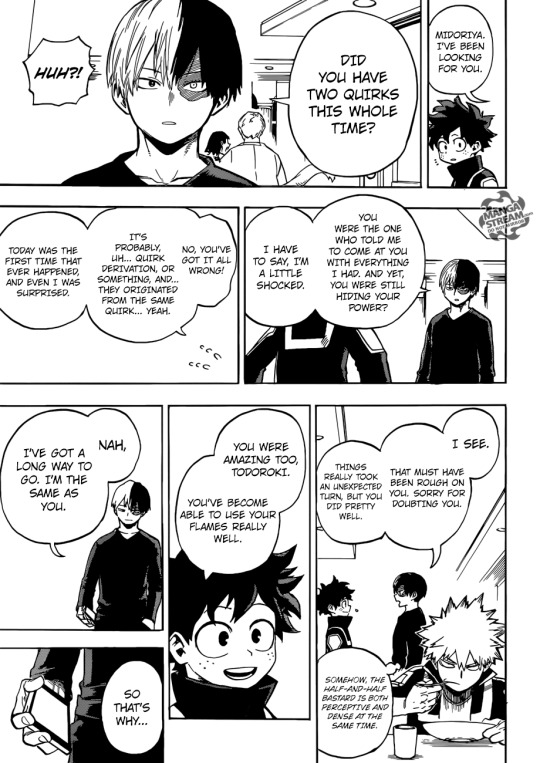
Wow... Now that Todoroki mentions how when they fought during the sports fest, Deku told him to come at him with everything he had and yet Deku wasn’t truly giving everything he had. Now to be fair, as Deku tries to say, this power just started to manifest, so its not like that was intentional. But you get what I mean here, that really awesome moment has been a bit cheapened in hindsight.
Well, I’m still glad someone is trying to press Deku about the two quirk thing cause last week everyon kinda dropped it. Though Todoroki now is dropping it so...
Well that all aside, Todoroki has actually texted back endeavor. Though its mainly to learn about the flashfire, but hey, baby steps.
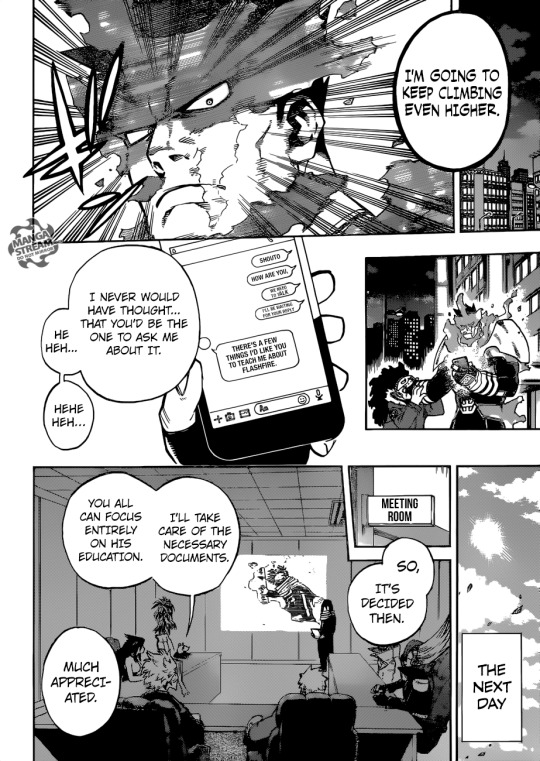
Oh you just know Endeavor has been checking his phone every other goddamn minute.
We cut to the UA teachers meeting and they pretty much are done discussing where Shindou will be going.
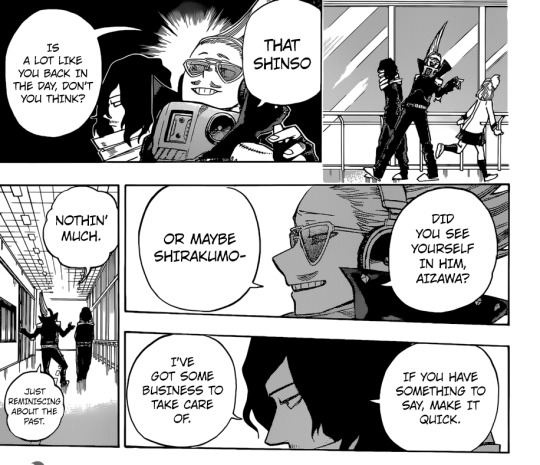
We see Mic finally say what the fandom has kinda been saying for a while now, Aizawa sees some of himself in Shinsou. Which... Yeah, a super powerful quirk that could be totally used for evil, but you still have something on the inside that makes want to do good. Also, you’re really both pretty surly.
But Mic also asks if SHinsou reminds him of Shirakumo, likely the flame haired guy in Aizawa’s flashback last chapter. And can I take a minute to say I love how Hori likes to foreshadow new character? Because he often doesn’t just drop them in as an individual, but he tends to show them with characters that have already established. Like when Gentle was going through famous villains he mention All for One and Stain, but then mentioned two other guys who will potentially be related to other obstacles. Or like with Overhaul’s gang who first appear during a Twice focused chapter.
Anyway, we cut to Eri who is naturally a little scared of Monoma.
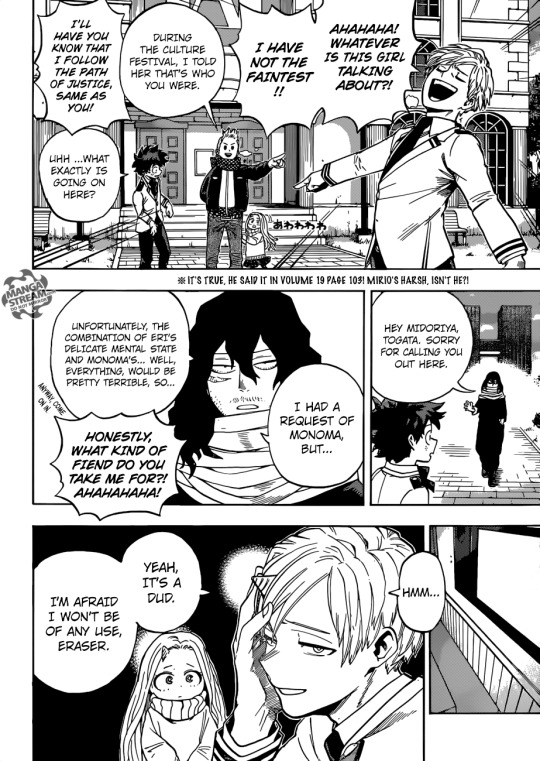
So Monoma was brought here to copy Eri’s quirk, but considering his... everything (I love that line) It might be best that Mirio and Deku be here to.
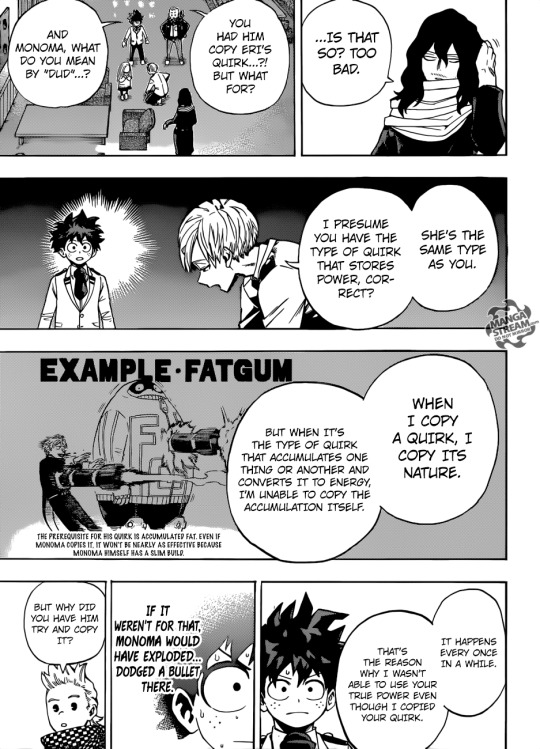
Monoma explains that he can’t use quirks that accumulates power through converting it, then its basically a dud. Same with Eri here.
Mirio asks why then was Monoma even brought here.
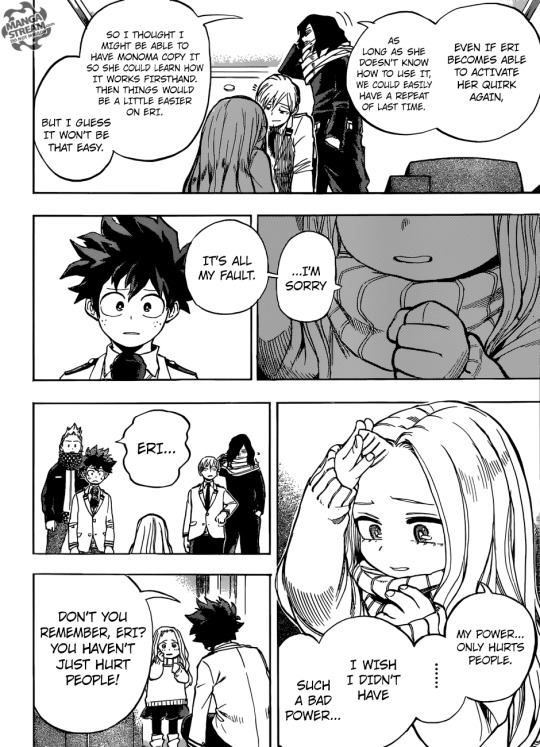
Aizawa says that having Monoma copy it would’ve helped Eri with control and here we go again. Adorable Eri moments.
I wanna take this moment to say Eri’s however, don’t feel like a cheap gimmick to pull at the audience’s heartstrings like other daughteru characters. She actually lived a life of physical and psychological torment and is still haunted it by it. Its not like we have one arc, boom, your cured from depression and can now exist just to do cute shit. So while Eri let go of Overhaul’s psychological grasps, she is still likely holding a lot of self loathing for her powers and what its done to people. So I wanna say that Eri is a great example of the cute young child character with a tragic backstory to make the audience care about protecting her, because she actually really needs it.
I know, kinda a wierd tangent, but with some recent shit in other series, some child characters just seem to exist to be cute after their “tragic” backstory and it bugs me.
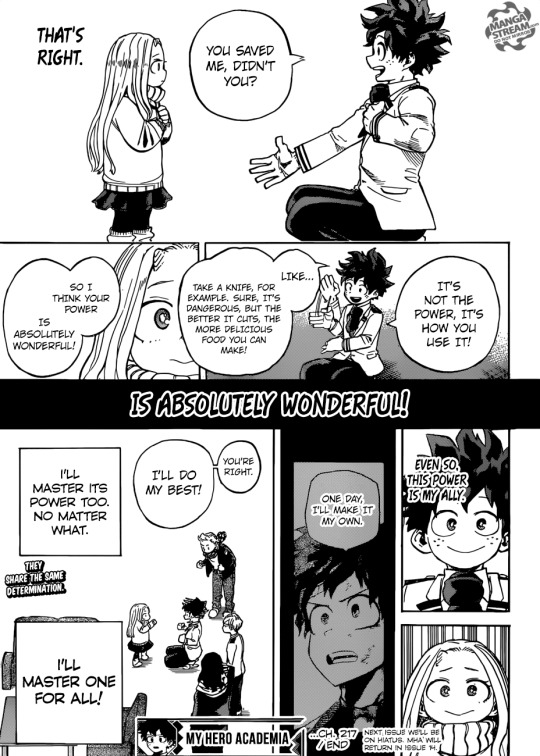
And our chapter ends, with Deku giving a vote of confidence that she will one day control her powers and he to vows he’ll do the same.
Post Chapter Follow Up: This chapter was great. Last week I had some issues, mainly because this recent arc kinda has the same problem as the Overhaul arc. Namely, it starts off really strong, has a contender for one of the greatest moments in the series, then a twist out of left field happens and the entire few chapters become a total cluster fuck. Which while last week, we were all happy for Shinsou and Uraraka, but how that arc concluded was still a bit of a disappointment when you saw how it was going before.
This chapter however, was a perfect little epilogue.
Positives are all of the character work from Todoroki and Endeavor, to Deku and All Might’s dynamic shift with the introduction of Bakugou, to Eri and Deku etc. I also wanna say this chapter is full of content, yet it is paced wonderfully.
Nothing feels too long, nothing feels too short. It also manages to start setting some stuff for the future. But nothing so obvious that its like, “This is what the next arc will be about!” no this was a self contained little chapter and I really enjoyed that.
I have no negatives for this chapter. Any that I could think of, I might blame that on more just what came before this chapter, but its nothing that it could fix or change right now.
Final Verdict: 10/10
While I have issues with the last third of the joint exercise arc, this chapter on its own is still a great epilogue to it
Great bits of character
Great bits of development
Hints of foreshadowing
Just all around good
#my hero academia 217#my hero academia chapter 217#mha 27#bnha 217#boku no hero academia 217#deku midoriya#izuku midoriya#bakugou katsuki#all might#toshinori yagi#kirishima eijirou#aizawa shouta#tetsutetsu tetsutetsu#tenya iida#uraraka ochako#class 1-a#class 1-b#monoma neito#kendou itsuka#eri#mirio togata#chisaki kai#kinoko komori#tokoyami fumikage#momo yaoyorozu#mina ashido
314 notes
·
View notes
Text
VLD8x09 – “Knights of Light Part 1”
8x09 – “Knights of Light Part 1”
The first time I watched this episode, I spent most of the episode being nothing but confused. This time, there is still a lot that confuses me, but I’m able to focus in on what does so. This episode retcons what has previously been depicted as the Lions’ consciousness. Now, the void that Shiro spent seasons three through six in is no longer the Black Lion’s consciousness. It’s just a miscellaneous realm of connectivity between everyone in the universe’s minds. In the style of how what was previously described as the Black Lion’s consciousness was animated, now similar appearing locations exist inside Honerva’s mind. The way universal consciousness is depicted in this episode is so uncontrolled that the episode has the Paladins arrive at Honerva’s mind twice during their attempt to get to her, or if the first mind they get to wasn’t Honerva’s then it was someone that isn’t identified. They get pulled into Honerva’s mind, but then the things characters say indicate that they’re not in Honerva’s mind. Basically, this episode’s production couldn’t keep clear about its locations. Maybe that’s just a problem with writing disembodied, nebulousness like this: you lose sense of the logistics of the action.
I’m also super annoyed that this episode now adds a second level of blamelessness to Honerva and Zarkon. The show has long been pushing the idea that neither of them are to blame for their actions because they were externally influenced by being poisoned by quintessence. But now, this episode says that they weren’t to blame because they were possessed by rift entities. I am not okay with a story telling me that it’s not the fault of abusive, torturous, genocidal dictators that they abuse, torture, and commit genocide.
The episode starts with Allura having another dream, floating in darkness. There’s a voice calling her name, I think it’s Honerva? Allura wakes up, Coran and Lance by her bed in the medical bay. Coran asks her about the entity, and Allura says, “I did what needed to be done. […] This entity, it is connected to Honerva in some way. I believe we can use it.” Coran goes patriarchal, saying, “I swore to your father I would look after you, but I fear I may have let him down.” Because how dare a woman make her own decisions.
Coran says, “This is the path of darkness.” We get lots of supposedly ominous statements like this in this part of the story, but none of it really amounts to anything. It’s certainly not foreshadowing, nor is it used as set-up to be undermined. It’s not as if the story is having it seem like the rift entity is dangerous only to reveal, as I suggested last commentary as having been a potential better story, that the entity isn’t dangerous, just upset at being imprisoned and hurt by Honerva. Nothing like that happens in this story. It’s just the entity is miscellaneously dangerous, and then the danger to Allura never happens.
I still think the way gravity works on the Atlas is odd. Shiro floats through a hallway up to a door, and once at the door, he steps down onto the floor. There’s no gravity in the center of the hallway, but there’s gravity along the sides of the hallway. It comes off to me as nonsense. Shiro opens the door and inside are the Paladins and Coran. “You wanted to see me?” Shiro asks. This again emphasizes how Shiro is not part of the team. The rest of them had this big conversation without including him in it until now.
Keith says, “We think we might have a way to find Honerva.” Allura tells Shiro, “The entity has bonded me to Honerva. The link is there whether we use it or not.” I guess this is just more miscellaneous, unexplained space magic. The entity isn’t really defined in this show. We’ve seen the entities in the past be aggressive, we’ve seen it merge with others of its kind to fight. That was presented as being a threat (3x07 “The Legend Begins). Now, we’ve seen it having been inside Tova, but precisely what it did in him wasn’t explained. I guess maybe the show is saying the entity is just there to let Honerva control and kill the Colony Alteans? That doesn’t make the entity really seem inherently threatening in and of itself though. That’s just using the entity as a mechanism to say this is how Honerva can control people. That’s Honerva, not the entity, being threatening.
Allura says (and Lance looks super angry while she speaks), “I believe if the Paladins connect using the shared consciousness of Voltron, we may be able to travel through the void and into Honerva’s mind.”
I have a huge problem with this. This is feels like a massive retcon to what “the void” has been shown as in the past. This is connected back to 5x03 “Postmortem,” in which all five Paladins used their bayards in Voltron. In that episode, Voltron is being attacked by a plant-virus and Pidge says, “Listen, this virus is affecting Voltron on a submolecular level. To drive it out, we have to tap into the quantum energy that binds us all to Voltron.” Allura then responds, “The bayards, they amplify each Paladin’s life force. They might provide enough power to drive out the virus.” The five of them put their bayards in their respective Lions’ bayard slots, and then they all appear within “the void.” The void is in “Postmortem” and in every instance that has dealt with Shiro and the Black Lion’s bond, like 2x07 “Space Mall” and 6x06 “All Good Things,” been about the Paladins and Voltron. The void has not been some otherworldly location separate from the Lions/Voltron. There is absolutely no reason whatsoever for the void to now be connected to Honerva. Honerva is not a Paladin. She has never been a Paladin. The psychic space of the Lions/Voltron should have absolutely nothing to do with her.
I can totally understand why people would see this episode and, on this alone, think that this is evidence of a massive change in the season’s plot really late into the season’s production. I can see how there’s a suggestion here of a revised story where originally the Paladins went into the psychic space of Voltron having something to do with Shiro and his having been stored by the Black Lion in her psychic space. If the void is now just some nebulous otherworld that does not belong to the Lions, then it completely erases the previously stated fact that the Black Lion kept Shiro in its consciousness. But the show’s use of the void in the past has been fairly explicit that that is what was happening. So, this episode contradicts severely with past episodes.
That’s not to say that the executive producers and writers of this show would have any problem with writing this story to contradict previously written story. They don’t seem to have any real desire to maintain continuity and consistency in the writing for this show. Since most of the plot of this series seems like the EPs and writers were mostly just winging it as they went along, I don’t think they cared that this violates what’s been established in the story. Sometimes, I honestly don’t think that Joaquim Dos Santos and Lauren Montgomery were even interested in telling a story. I think they just wanted to do story-less animation. So many times, this show feels like they were trying to do nothing more than to make some Voltron: Defender of the Universe AU fanart. They certainly did not construct a coherent, cohesive narrative. Maybe that’s part of what angers me so much about VLD. I’m a writer. I love storytelling. I love animation, but I come to animation as being a medium through which a story can be told. JDS and LM saw this project as animation first and foremost, and storytelling was only secondary, at best. The story of this show was only something they were forced to do in order to be allowed to make animation. I don’t think they really cared about telling a story.
Back to this episode. Pidge says, “That could in theory give us access to her physical location as well as key information on how to defeat her.” I’m still stuck on how they would see entering Voltron’s psychic space would have anything to do with Honerva. This is just feels forced.
Keith says, “Honerva is capable of creating galactic komars, wormholes, Robeasts,” I know this show doesn’t do logic, but Honerva’s “galactic komar” was dependent on the Robeasts. How many Robeasts did she create from the statues at Oriande? I know, the show doesn’t show us so that it can have an endless supply for whenever the writers want to pull a new one out of the bag and not have to keep track of the logistics of them all. All of the Robeasts used in 8x06 “Genesis” should be out of the story. Oriande and the white hole went boom, so none of them there should have survived (though since Merla pops up again, I guess they did). The ones used as part of this “galactic komar” though have been found; that’s where the four of the six Colony Alteans now onboard the Atlas came from. So, did the Atlas just leave those Robeasts laying on those respective planets? Are they just sitting there waiting for Honerva to reclaim them? Otherwise, how is the “galactic komar” still a threat since it was built out of tech (the mechas and the Olkari cubes) that are destroyed or no longer functioning?
Keith continues, “And now, Lotor and his mech are out there somewhere.” Again, this show presents this story as if Lotor is actually alive, but we’ll soon be shown that he’s a melted corpse. It does make the season feel like it was re-edited. If it wasn’t re-edited, then this is absolutely the creative team for this show repetitiously manipulating the audience. If they hadn’t already proven themselves to be more than willing to engage in audience manipulation, especially when it comes to Lotor’s part in the show’s story, then I might be more willing to give more weight to the possibility that this was re-edited. I can see JDS, LM, and the writers in a meeting saying to write the season’s story to make it look like Lotor is alive only to surprise twist! he’s been dead the whole time. They wouldn’t care about the inconsistency that writing this season that way would have because their goal would be to create the surprise twist! that they seem to think is how you create a story. And it would make sense that they would think that that is how you create a story if creating that story was always secondary, at best, to their goals with this project.
Keith says, “We don’t have any other leads. It might take lifetimes for another opportunity like this to come around.” Are you kidding me? Keith thinks that Honerva is going to sit out and do nothing for “lifetimes?” Remember, they’re saying they need to do this in order to find Honerva, that’s the opportunity of a lifetime: a chance to find her. But if Honerva’s not done doing what she plans to do, then she’ll show up again, thus they will have found her by her just continuing whatever it is she’s doing. This line of dialog is just not written well.
Shiro speaks. “I spent a lot of time in the infinite void.” Yes, you did, and that void was inside the Black Lion, not some otherworld that is connected to Honerva. “And if you face Honerva in the void—” They shouldn’t be able to because how is Honerva able to be in the Lions’/Voltron’s psychic space?
Lance says, “We’re messing with powers we don’t fully understand.” Unfortunately, the writers of this show don’t fully understand those powers either because they didn’t bother to define those powers.
Coran says, “It’s been a long time since it was only the seven of us in a room together.” That’s because the writers didn’t bother to continue to write you guys as the main characters.
The Paladins get in their Lions. Allura has a flash of Honerva’s face and screams. She then has a vision of Honerva and Merla floating in a hallway. It makes me think of how the Shiro-clone had visions of Honerva going to Oriande in 6x01 “Omega Shield.” Unlike with Allura, it couldn’t be that the clone had a rift entity in him. I’m still wondering why exactly the clone was able to see Honerva in that episode. The initial blast of Allura seeing an outline of Honerva’s face made it seem like Honerva was directly trying to access Allura, but then the vision of Honerva floating down a hallway would suggest Honerva was just doing her thing and Allura was eavesdropping. Even within just a couple of seconds, this show seems to contradict itself.
The show then cuts to a total tonal dissonance by having Veronica and Iverson discussing Shiro’s win at arm-wrestling while having a “robot arm.” I really like (the barely included) Curtis in the background turned in his seat and listening to this conversation while having an adorkable smile.
So, Voltron forms, the Paladins do their joint bayard use. The animation team was clearly lazy and just reused a shot from the animation in 5x03 “Postmortem.” You can tell that it’s reused animation because Keith is currently the Black Paladin. Keith, though he has the black bayard, wears red armor. In the animation of the bayards being used here in “Knights of Light Part 1,” the user of the black bayard has black armor, just like he did in “Postmortem.” So, in this particular shot here in “Knights of Light Part 1,” that’s Shiro’s arm, not Keith’s.
Everything glows and then turns dark. Then the Paladins enter the void. Allura declares that they “must travel through that light.” Generic, but okay. She says, “The entity draws me toward it.” That implies that either the entity has some agency or that for some reason the entity is unwillingly attracted toward Honerva. (I really hate that to continue to discuss this episode, I have to accept the retcon that the Lions’/Voltron’s psychic space is not the Lions’ consciousness but some otherworld that Honerva is connected to.)
The Paladins use their suits’ jetpacks to move toward the light. I know it’s a minor matter, but they’re not physically in this location right now; they’re sitting in their Lions. So, why write them to look like they’re using their jetpacks to move through space? They get to the light, which fills the screen, and then dissipates into normal looking space. Lance says, “What is this place? It’s like I can hear what the universe is thinking.” What? This show is going to write the universe itself to be sentient? I imagine that this line really is nothing but the writers thinking they’re being profound when really it’s just them being nonsensical.
Pidge invokes the Olkari having said everything is made of the same energy. Hunk replies, “So, thoughts are linked across some kind of, what, cosmic connection?” I’m so uninterested in this. The psychic space used to seem special, that it was a manifestation of the Lions’ consciousness. Now, the void is just some generic overmind of the universe. The implication of this is that the Black Lion didn’t save Shiro’s spirit at all. If the void is not some psychic space of the Lions’ consciousness but instead is just a universal overmind, then Shiro’s spirit wasn’t being stored in the Black Lion. Shiro’s spirit was just where spirits are.
Allura has another flash headache, and then everyone else does too. They see Honerva and Merla somewhere. It looks like Oriande with how the mechas are standing in the background. Cut to Voltron’s eyes glowing.
Back in the overmind. Allura explains that “that was Honerva. The entity inside of me is connected to her.” This dialog is getting repetitive. Allura says that they now have a psychic link with Honerva. “The closer we are to her, the stronger that link.” But of course, they’re not physically closer to her, so I guess this “closer” is referencing their being psychically closer to her here in the overmind? In which case, this line of dialog becomes a tautology. Lance worries that Honerva will use this link the Paladins now have with Honerva’s mind to find them. Then they will have achieved their goal; remember, they’re doing this to find where Honerva is. Also, Honerva has enough space magic already, I doubt she needs this link to find them.
It feels really weird for Keith to say, “This isn’t just on you now, Princess.” They haven’t interacted with Allura in recognition of her as a princess in a long time. It feels strange hearing him do so now. It actually sounds kind of condescending when he says it. Keith tells them all to miscellaneously focus on Honerva’s energy. They glow. The Lions’ eyes glow. Each Paladin is shown associated to their Lions. And then the Lions are flying through space.
What is happening here? I guess the Lions aren’t actually flying anywhere, that this is somehow now them in the overmind going with the Paladins through the overmind to Honerva’s mind? But then, they fly into the distance and there’s a flash of light and the Lions are back together in Voltron. So, is this actual Voltron or some Voltron in the overmind?
This is a huge part of why I hate this episode: It so too damn confusing. I can imagine the creative team had certain specific ideas in mind when they were doing this, but they failed to tell this story clearly, and I don’t know what they were trying to tell.
Voltron looks like it’s travelling through space. There’s even planets and moons. Because Voltron actually travels through space, there’s nothing visually that allows for this to contrast with actual space if this is supposed to be Voltron traveling through the overmind.
Hunk says, “I can feel something, like an energy inside me.” And Allura says, “It’s the entity.” The entity is now in Hunk? In all the Paladins? Keith says, “It’s like a dark realization washing over.” This line does not mean anything. It’s just miscellaneous spew that the writer thinks sounds profound and ominous. It doesn’t though. Pidge says, “It’s like we’re begin pulled by a tether connected to our souls.” Again, this is nowhere near as profound as the writer thinks it is. It also places the locus of action on the entity, pulling them, rather than on the Paladins actively traversing through the overmind. It’s sort of depriving the Paladins of agency. It also doesn’t explain why the entity is being drawn toward Honerva.
They come upon what looks like a black hole. Everything goes dark, then every looks like neurons, which I assume is supposed to be Honerva’s brain. Then Voltron looks like it comes out of a light, like it’s left the neurons behind. It’s so confusing. I’m really trying to understand what this animation is actually depicting, but I don’t really know.
Voltron flies through space some more, and then everything turns dark again. And then Voltron is flying through that darkness with little bits of quintessence? floating off of it. Then Voltron separates into little colored dots. From the wide shot, you can’t tell if they’re the Lions or the Paladins. They float through blackness with more quintessence-bits floating from a glowing event horizon. The camera reorients, and the glowing Paladins land on the black surface.
I don’t know why Voltron was involved in this traversing of the overmind. What did Voltron actually do for the Paladins in this process? And why is Voltron now not part of the process? Why did it poof into just being the Paladins in the overmind again? Also, the animation already had Voltron enter what looked like a black hole, which I assumed was Honerva’s mind, but then they left it, floated through space some more, and now have arrived at what looks like another black hole. So, why was there a first black hole if that wasn’t Honerva’s mind? Whose mind did that first black hole belong to?
They stand on a surface, and Allura says that Honerva’s mind is “on the other side of this wall.” There are streaks of black with streaks of red or orange for eyes moving under the wall. Allura says, “It feels like that these are the souls that Honerva has defeated and corrupted.” Why has the show not shown us that Honerva could corrupt souls before now? (Or is corrupting a soul what she did to the clone to be able to control him? That would make it even more offensive that the Paladins described the clone as evil.) Honerva corrupting souls just comes out of nowhere. There is nothing in the show prior to this that sets-up this reveal. And, if Honerva can explicitly corrupt someone else’s soul, then how did the writers think it’s acceptable for them to expect the audience by the end of the series to view Honerva as absolved of her horrible behavior?
The show here says Honerva can corrupt souls, it has been saying for seasons now that Honerva was corrupted by quintessence poisoning, and in this episode says that Honerva was corrupted by a rift entity. It’s all a mess that does not locate motivation for character action within the character.
Spectral hands come out of the floor-wall and grab Allura first and then all the Paladins. There are a lot of hands, so there are a lot of souls that Honerva has corrupted. The Paladins, with the exception of Keith, are pulled down into the floor-wall, into Honerva’s mind. Why wasn’t Keith pulled in?
First Pidge opens her eyes and the way the place she is looks, she’s in a greenish version of what had been depicted as the Black Lion’s consciousness in 6x06 “All Good Things” when Keith spoke to Shiro’s spirit there. But Allura just said that “on the other side of this wall” was Honerva’s mind. But the visuals of this would suggest that this is the Green Lion’s consciousness. So, how is the Green Lion’s consciousness inside Honerva’s mind?
A green-outlined shadowy person with a polearm weapon appears and attacks Pidge. Cut to a yellowy-orangey area where Hunk is being attacked by a similar figure with a staff. Lance in a red area fighting one with a sword. Allura in blue and fighting one with a bow. Keith meanwhile is still on the surface of Honerva’s mind.
Pidge says, “I can’t even feel my Lion.” I still don’t understand why the animators chose to have the environments the Paladins are fighting in resemble what “All Good Things” presented as the Black Lion’s consciousness if here the Paladins are, as Pidge says, disconnected from their Lions. I don’t know if the executive producers and animators in making this episode either didn’t remember or recognize the significance of this background from when it was used in “All Good Things,” but that’s hard for me to accept as a possibility. Or if they instead thought that assigning meaning to animation like they did for this background style from “All Good Things” just didn’t matter and that they could just port over the background style and ignore the previous meaning.
In Shiro and Keith’s conversation in “All Good Things, Shiro said, “somehow the Black Lion retained my essence,” to which Keith asked Shiro, “Is that where we are, in the Black Lion’s consciousness?” So, this background style has most definitively been established as being that of the Lions’ consciousness. But now, Pidge says she “can’t even feel [her] Lion.” I just don’t know what to make of this episode. It seems so disconnected from what has come before. No wonder people think this is the result of shattering some original story and reconstituting the pieces into this confusing mess.
Allura’s attacker shoots an arrow at her. She holds out her hand, shadowy wisps float off her hand, and the arrow stops. Her eyes turn black. She screams an inhuman scream. I guess we’re supposed to think this is the rift entity acting through her?
But then glowing, spectral versions of the Lions show up in each of the four’s combat area. So, they’re supposed to be inside Honerva’s mind, though it looks like the visual style previously used to depict a Lion’s consciousness, Keith can’t get inside Honerva’s mind with the other Paladins, but the Lions can enter into Honerva’s mind to join their Paladins? The Lions roar, and the dark wisps are blown by the wind of the roar off of Allura’s eyes. The shadowy figures the Paladins have been fighting have their shadow blown off of them revealing them to be the past Paladins.
So, we’re supposed to understand that Honerva somehow corrupted the souls of the Paladins. How did she corrupt Alfor’s soul? When did she corrupt Alfor’s soul? We saw in “The Legend Begins” that Alfor was killed by Zarkon on a bridge with no one else around them.
Allura’s eyes go dark again and she screams her inhuman scream and attacks Blaytz. The Blue Lion roars again and everything goes white. Then we see Alfor giving the other old Paladins their armor and their bayards. This scene depicts Zarkon pre-quintessence poisoning, and he says, “With this much power, we will be unstoppable.” So, his being a dictatorial, genocidal conqueror was always a part of who he was. He didn’t become bad because of quintessence poisoning. So, the show using the poisoning to excuse his behavior is just offensive. This flashback scene of the old Paladins unintentionally emphasizes Zarkon’s lack of presence in this fight so far, emphasizes Keith’s exclusion from the fight.
Allura stops short of stabbing Blaytz. “It’s really you,” she says. Pidge says, “Your soul, Honerva must have—” and Hunk continues, “—trapped you here somehow.” Of course, that makes me ask, how did Honerva do this? Especially with Alfor? We’ve seen his death. When did Honerva trap the Paladins’ souls inside her own mind? And why has that never been part of the story until now? Honerva has been active in this show’s plot for the whole series. Why is it only now that her having done this is relevant? This has never been a part of anything in the story until now. It clearly was not planned as part of the overall story arc. This really is just coming out of nowhere. And that, beyond this part of the story being super confusing, is why I don’t like it. The idea that the current Paladins would have to fight the old Paladins is a really interesting premise, but there’s been no set-up to lead to this fight. There’s nothing to this that makes it feel the inevitable outcome of the events prior to now.
Like too much in this show’s story, this is a set piece. It seems conceptualized wholly independently of the story and then the story is what was written to try to force connection between set pieces. It’s why the reveal of the clone and resulting battle between Keith and Shiro had a certain grandeur to it, but there was no reason ever given in the show for why Haggar had hundreds of clones of Shiro made. That fight was a set piece that was forced into the story rather than grown out of the story. Similarly, this fight with the old Paladins doesn’t come out of the story, it’s wedged into it, the story is forced to accommodate it, and that’s why it is so disconnected to what has come before. And in being so disconnected, the moment is deprived of the emotion it could and should have.
The Lions roar once again, the souls of the old Paladins and the backgrounds fracture and light pours out of it all and everything goes to white. All of the development in this conflict comes from the Lions, so if the Lions could clean the Paladins’ souls of corruption, they why have they been sitting there in this fight waiting instead of just doing so from the moment they came into this space?
Cut to a flashback with Alfor, Gyrgan, Trigel, Blaytz, and Coran discuss how Zarkon is going to come for them. Trigel wants to fight Zarkon, but Alfor doesn’t want to risk Zarkon getting the Lions. Alfor says they’ll use the other Lions to seal the Black Lion and then send the other four to where they were until they were found at the beginning of the series. Alfor tells Coran to use the Castle of Lions to take Allura and the Black Lion away. But then, Gyrgan says, “Then it is decided: We go into battle together one last time.” Of course, that doesn’t match Alfor’s having rejected fighting when Trigel suggested it first.
Cleaned of having been corrupted by Honerva, Trigel asks, “Where am I?” Hunk answers Gyrgan, “You’re in the void, just outside of Honerva’s mind.”
One, the backgrounds still look like the Black Lion’s consciousness, but Hunk doesn’t say they’re in their respective Lions’ consciousness, he says they’re “in the void.” But then he says that they’re “just outside of Honerva’s mind.” Keith is, the rest of them are not. The rest of them were dragged under the barrier into Honerva’s mind. This show really cannot keep this straight. So, which is it? They were pulled into Honerva’s mind, but it’s outside her mind. They’re in the void, but it looks like the Lions’ consciousnesses.
Trigel says she’s glad that “someone so connected to the world around her is piloting the Green Lion.” I still don’t think this show has actually shown Pidge to be connected to nature. “My race believes observation to be the most revered attribute.” As I’ve said before in my commentaries, I really don’t like when science fiction writes aliens to be monocultures. Trigel’s race doesn’t believe anything because it was made up of a bunch of different people, who like humanity, all have a bunch of different thoughts and opinions and beliefs, or at least her race should be like that if it was written realistically. Sorry, that’s just a peeve of mine.
Blaytz tells Allura, “People often overlook me because I was,” there’s a very slight hesitation in his voice, “different.” I very much imagine that this is supposed to be a reference to Blaytz being gay. Unfortunately, this phrasing sounds to me like how a straight person would write a gay person to speak. Using the word “different” as a stand-in functions like someone who doesn’t want to get personal, which you have to do to write dialog well. It’s seems clear to me that the word “different” was chosen to avoid actually, openly talking about Blaytz’s being gay. It makes the character’s experience generic, which causes it to lose emotion and meaning. I can imagine the writer defending this dialog by saying writing it this way gives it universality, but that’s a thought that comes out of unexamined privilege. By excluding the specifics in favor of claimed universality, you deny the cause and content of the discrimination and exclusion you claim to be rejecting, and so cease to be actually rejecting anything.
Blaytz then continues talking about the Blue Lion picking him. “But the Blue Lion recognized something in me, something others couldn’t see. It saw the greatness within that even I did not.” Imagine this dialog but instead of Blaytz talking to Allura, he was talking to Lance. It would be totally fitting in theme as another step in Lance’s struggle to recognize something great within himself that even he could not see. Lance had, until it was abandoned by the writers, serious issues with self-confidence and believing himself to have value as part of the team. Even this episode hints at that abandoned element of Lance’s character back at the beginning during the meeting with Shiro when Lance expresses pleasure that calling him “the sharpshooter” is now something the team does fondly. It would have made so much more sense for Blaytz to have said this to Lance. But instead, he says, “You, Allura, have greatness within you as well.” This isn’t something she needs him to tell her since she’s hasn’t wrestled with feeling fundamentally worthless, especially once she learned Altean alchemy at Oriande. She has doubted her ability to succeed, but not her inherent worth. “You’re so much like your father, and yet so different.” This line is so cliché and so meaningless.
Lance, with his long history of insecurity, gets nothing from Alfor that supports him as a person. Instead, the show returns to having patriarchy as the governing influence of Lance’s relationship with Allura. “Through the Lion’s bond, I could feel your love for my daughter,” Alfor says. “I could feel yours as well,” Lance says. Why is this show juxtaposing the love of a father for his daughter to the love a guy feels for his girlfriend? It’s just gross. It makes Lauren Montgomery’s claims that feminism has any influence whatsoever in this show seem absolutely absurd. But then, LM thought killing Allura at the end of the series was feminist. I still cannot get over how she considered having Allura reincarnated as an infant, literally infantilizing Allura, and have her then raised by Lance. It’s so creepy.
Alfor tells Lance, “We face many quests throughout the cosmos, but the most amazing journey is that of life. And the biggest question you face is who to go on that journey with. I’m glad my daughter chose you.” So, Lance receives nothing, no personal support from his Paladin-parallel. The others tell their respective Paladins something supportive of them, but all Lance gets is Alfor’s patriarchal approval of Lance as a suitor for Allura. This is such an absolute disservice to Lance’s character.
Keith remains on the surface of Honerva’s mind, unable to get through. Then suddenly the Black Lion is there. Why did it take so long for Black to show up for Keith when the other Lions had long showed up for their Paladins? Keith gets no special moment of affirmation with a previous Paladin. It feels absolutely like he was excluded, but for no reason other than they wanted to save a conflict with Zarkon until later. But if Zarkon was corrupted the same as the other old Paladins, why wouldn’t he have attacked Keith the same as the other old Paladins attacked their current counterparts? Almost as soon as the Black Lion shows up here with Keith on the outside of Honerva’s mind, the other Lions show up here too. The other Paladins, both old and new, show up here on the floor-wall to Honerva’s mind.
Allura runs to and hugs her father. Alfor says, “It is fitting that I would find what is brightest to me in the darkest place.” This feels a bit cliché. Allura says, “All that I have done, I have done to make you proud.” Trust me, I know what it feels like to want to make a parent proud, but this is so limiting. This is Allura defining herself by her father’s acceptance rather than defining herself by her own self. It’s very patriarchal to write a young female character to define herself by her father. I just don’t like it.
There’s a headache flash, and they see Honerva looking at a mecha, one that matches the one Allura saw Lotor piloting in her vision last episode when Lotor said, “Follow me!”
Alfor says to Allura, “You hold a dark entity within you! Don’t you know how dangerous that is!” Thank you so much for your patriarchal judgement, Alfor. Allura is so stupid that she couldn’t possibly know about something being dangerous unless you chastise her for it. Also, ignore the fact that this supposed dangerousness never manifests in the story.
Alfor says, “That’s what led to Honerva and Zarkon’s end!” So, not only were they poisoned by quintessence when they went into the quintessence field in “The Legend Begins,” now the show is saying that Honerva and Zarkon became who they are because they were possessed by a rift entity? The show is really doubling down on absolving Honerva and Zarkon for being abusive, murderous, genocidal dictators for 10,000 years. Not only is it supposed to be not their fault because they were poisoned, now it’s also not their fault because they were possessed. I do not find the-devil-made-me-do-it stories even remotely interesting. This is just the creative team of this show being too cowardly to actually have their villains be villains. They don’t mind retaining their proclamation that Lotor was evil all along because declaring him to be evil was their big, desired plot twist. But they were too scared to commit to having Haggar and Zarkon as villains. For so long, both characters were written as just generic, maniacal villains. Then, I think the creative team thought they were making Zarkon and Honerva be more complex villains by saying they did the horrible things they did because of an external force (quintessence). Now, the show is just creating another way with which they can absolve the characters of the horrible things they did. But it’s not like Honerva and Zarkon just said hurtful things. They abused their son. They enslaved people. They tortured people. They murdered people. They committed genocide, murdering the population of whole planets. This is not something to forgive them for. And it’s offensive that this show is telling us to do so.
Also, if Honerva is supposed to be absolved for her actions because she was being controlled by a rift entity, how is it that the show simultaneously has Honerva affecting others through the rift entity? She was trying to kill Tova last episode through the rift entity in him. So, is the rift entity controlling Honerva, or is she controlling rift entities?
Allura says, “I am not going to be afraid to use the power I have.” She says, “We need to continue,” and someone, Lance, I think, says, “But how do we get past the wall?” Well, the spirits of the old Paladins dragged everyone but Keith beneath the wall earlier, so, try that.
Allura says, “It’s like I can feel her thoughts. The way through is with the darkness.” I don’t know how these two sentences are supposedly connected. Is this the extent of what the entity is doing for Allura, just getting her inside Honerva’s mind?
Alfor says, “Honerva went mad—” it’s annoying that the show equates mental illness with dangerousness in this line of dialog “—obsessed with darkness and power.” She was obsessed with quintessence. So, is the show now calling quintessence “darkness?” I thought quintessence was supposed to be life energy.
Allura does a touch-hand-glow and the surface beneath them glows. A light line streaks through the surface and the geometrics like that which appear around wormholes and like the ones Honerva created on Oriande when she retrieved Sincline appears beneath them all. Everything starts glowing white and they disappear from the surface.
This episode is a mess. It’s ambitious, but it’s so unwieldly. It significantly contradicts previous parts of the show, and that really, really bothers me. I don’t like how it takes what felt special (the idea that the Lions had a psychic space created by their consciousness, and that that is where the Black Lion kept Shiro’s spirit after he died) and now just makes it all be some generic universal overmind.
And I really hate that this show is now saying Honerva and Zarkon’s horrible behavior is the fault of being possessed by rift entities. Before it was the result of being poised by quintessence. Did the show forget that they had already assigned one thing to blame for their behavior other than themselves? And that is the ultimate thing that angers me about this. Both quintessence poisoning and rift entity possession are cheats. They reveal a fear of letting villains be villains. They refuse to seriously deal with the reality that these characters are horrible people. By assigning blame to an external source, now two external sources, the show prevents the villains from having to confront their behavior, and the protagonists lose the ability to condemn the behavior as the narrative manifestation of their final confrontation with the villains. The same way that these episodes keep telling us the rift entities are a threat without ever really resolving that, the series, by locating the blame for the villains actions in external sources, never resolves the villains’ actions.
#voltron legendary defender#voltron#vld#voltron criticism#vld criticism#voltron critical#vld critical#vld season 8#vld 8x09#commentary
36 notes
·
View notes
Note
How do you not let the fandom ruin rwby for you because I love the show but am slowing losing that love because of all the shipping wars and that everything little thing that has yang and blake in it is turn into shipping. It like no one care for the show but only for that stupid ship.
Because I know for a fact shipping fandoms, vocal as they may be, are still a small fraction of the overall fandom that’s here for the awesome fights and their favorite characters and just to see how the story goes, and in this case especially within Atlas, there’s alooooot of stuff about to go down, and then there’s Vacuo to think about which is entirely a mystery at this point but at the very least will have Best Boy Sun as a central figure which is never not a great thing.
But speaking on the ship war itself, Eclipse depends on explicit moments within the show itself with no fucks to give towards “they have to go with this or fandom xyz will get mad” bullshit.
Just look how hard they try to downplay their farewell as Blake friendzoning and Sun falling back, in their attempt to eliminate Eclipse as the very real threat it is, despite the unbearably clear foreshadowing of them reuniting down the line. Contrast this to how on the flipside, we say their storyline centered on Adam is done and there’s nothing left of story to tell within their bond because the rift has been mended and that was the story they meant to tell all along. Blake has no real role to play in Yang’s storyline with Raven because Yang dealt with that on her own. Yang has no place in Blake’s faunus rights storyline because that’s been Sun’s place, and Wiess’ to a smaller degree. Blake still has a role to play in Sun’s end of things in Vacuo, so there’s opening for further development between them there without it forcing the audience away from everything else because at this point Blake and Yang focusing on a budding relationship let alone realization of bisexuality if they really wanna take it that far is just too far removed from all the combustible elements at play. Its hilarious really, Blake and Sun’s development in Menagerie ran pretty smoothly without jerking the audience out of the storyline (because Sun isn’t acting on a 24/7 “must get Blake to want to date me” motivation, they’re friends who share a mutual attraction and keep things light and casual when they do broach the issue) and then when they part ways, he simply goves her the time and space she needs to deal with all the complications, not forcing a relationship out of her right there and then. But on the flipside, if Atlas comes and goes and nothing further is done between Blake and Yang, that ship is sunk. Basically for the Bees to actually start buzzing the relationship has to actually be force fed in universe in an already overpacked arc. IF Blake was at some kind of crossroads as far as whether she had feelings for Yang or not (because its already well established she has feelings for Sun, that’s undebatable no matter how they wanna twist it), she’d need time to deal with that, but at the same time, if she does, we need to SEE that she is. We plain have not the entire run of the show so far. And as for Yang? Its a reach at best.
9 notes
·
View notes
Text
Why the Jon/D*any romance doesn’t work (Part 3)
When everyone and their mother has a different take on the same line of text
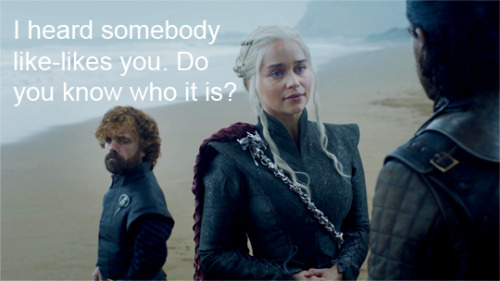
I must warn you in advance. In this 3rd post in the series (1, 2) we will go down the rabbit hole every woman has found herself in while reading her Tinder messages trying to extract some sort of meaning from a seemingly unrelated string of emojis.
Yes, boys and girls, now is the time to try and answer the all-important question that has plagued womanhood since the beginning of time: What does Jon mean when Jon says words?
Answering this question is extremely difficult since most of what he says can be interpreted in different ways. People have chalked it up to bad writing, rushed storyline and the actor’s limitations but is that really a fair assessment?
When analyzing the Jon/Dany scenes more closely, you begin to realize that they work on multiple levels both plotting wise and emotionally. It’s that both the direction of the scenes as well as the actor’s mannerisms aren’t what people expect them to be in that situation. The writers aren’t doing a bad job at presenting you a generic romance, they’re working overtime to both give you the basic structure of said romance while at the same time subverting every trope that they employ.
When trying to take things at face value and analyze the scenes as romantic in nature, the more I was hit with lines upon lines of dialogue that were vague, banal and impersonal. I started envisioning my scriptwriting editor taking out her red pen and cutting out these lines with notes like: what does that even mean?!? Because no editor in their right mind would’ve let this dialogue and these scenes as they are.
So why were these allowed to be filmed into a production of this level? My explanation for this is that these lines and scenes, while uninspired and unflattering to the character or the actor forced to speak them, do have the advantage of allowing the audience to read whatever they want into them, which they will because of how hotly anticipated this ship was. They’re simply allowing you to get tangled in the web so they can pull the rug from under your feet in season 8.
It might seem like I’m exalting the Ds writing abilities to extraordinary levels. But I’m not. It’s not that brilliant, to be honest. It’s a trick, nothing more. And they do it because they can. No other TV show could get away with inciting a ship this way only to annul everything put on screen later on. No show except Game of Thrones and no other ship except Jonerys. Why? Because Jonerys didn’t need to convince people to root for them, those people were already on board the ship long before Jon and Dany danced the devil’s tango. This has been one of the most hotly anticipated romances in TV history so the scenes only came to enforce what people wanted to see.
So do the writers really have anything to lose by trolling us? It doesn’t matter if Jonerys is real or fake, underdeveloped or the world’s most epic romance., everyone on planet Earth will still be tuning in to see every episode of the next season. If the Ds decide to confirm their fans dreams, then everyone who isn’t onboard will have to shrug off the inconsistencies and move on. If the political!jon theory is revealed in season 8, they will be hailed as the greatest twisters in the history of twisting. Every TV critic will write about it, will publish think pieces and then one day they will stumble on to Tumblr and discover my metas and I will become famous the world over …. Hey, a girl can dream, right?
So, let’s forget for a second that Dany and Jon were the ship that broke the internet and let’s look at the rest of the island scenes keeping in mind both the romance but also the possible subversion of said romance.
Scene 6:
youtube
Happy to report that Dany did not ask Jon to bend the knee in this scene.
Yay!
Progress!
Sort of …
There are 3 major things that are wrong with this scene in terms of the romance subplot:
1. Jon’s reaction to Dany’s temper tantrum.
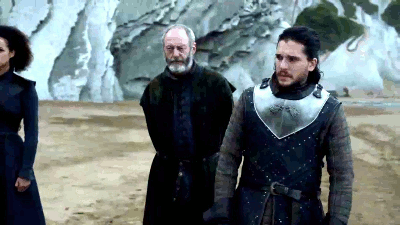
He looks like he’s about to send her to her room, with no supper. Btw, I hate it when people say that Kit Harrington is a bad actor. He might not be acting out what people want to see but his micro expressions are pretty on point.
Jon isn’t wrong in being frustrated by Dany’s public humiliation of her hand. However, it does undermine the romance, particularly since Jon’s reaction goes unnoticed by Dany. And the whole thing could have been avoided had the people behind the camera simply not shown us his reaction at all. These types of reaction shots are not filmed simultaneously with the rest of the scene so it’s actually a lot of extra camera work, positioning and actors doing the same scene over and over again just to show us that Jon is annoyed by Dany but chooses not to say anything. And they do this because the script, the blueprint of the story, told them to do it.
Alternatively, you could have these reaction shots take on a positive connotation by having Jon intervene and lecture her on her rudeness, for example. That would position him as the only person willing to tell her the truth, another romantic trope that pops up in couplings all the time. But the script doesn’t go there, instead planting this seed of Jon as being duplicitous in his interactions with the woman he’s supposed to have developed feelings for by now.
Like I said, the writers don’t have a lot of time on their hands. They need to get us all on this ship as quickly as possible; there are only 3 episodes left. And yet they continue to torpedo our trust in this romance at every turn.
1. Dany turning to Jon for help is unearned.
As we’ve already established they’ve spent the last 5 scenes talking about knee bendings, white walkers and little else. There is no common ground between the two of them that would make this request remotely romantic. So when Dany, out of the blue, decides to ask Jon what she should do, we can’t go: “Oh, look! They trust each other now. They’re a team.” On the contrary, we’re as taken aback by this as Jon is.
2. He doesn’t actually help her.
The conversation goes like this:
Dany: what do you think I should do?
Jon: Don’t burn people alive.
Dany is moved by his speech, so moved in fact that she doesn’t notice he didn’t actually give her any advice on what to do, just a general rule of thumb on not turning people into torches.
This a pretty blatant subversion of what is a very useful trick writers use to build trust and intimacy in a romantic plot: have one of the partners help the other with a problem that they have.
By writing yet another general, non-committal response from Jon, they’re denying us, the audience, the reason to cheer for this romantic pairing and thus frustrating the momentum needed to credibly build up this relationship.
Scene 7: (or as I like to call it the “there’s a bridge I’d like to sell you” scene)
youtube
It doesn’t do this scene any favors that whenever Missandei starts talking about Dany, all I can think is “cult recruiter”.
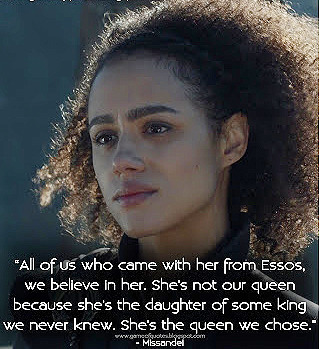
It’s like she’s heading the welcome parade into Jonestown…
Leaving that disturbing imagery aside, why is this scene so deeply unsatisfying?
In order to answer that, what we really have to ask ourselves is what is the purpose of this scene? There are no useless scenes in scriptwriting. Every scene must serve a part in telling the story.
Is the purpose here to show that Missandei idolizes Dany? It can’t be. We already know that. Is it foreshadowing for Davos moving to Narth because it sounds like a “liberating” place? Doesn’t quite sound right.
It must be a scene that pays service to the Tyrion/Jon scene where Jon is advised to seek out people close to Dany. So the purpose of this scene is to see Jon learning some very positive things about Dany, from her number one fan. This feels like a very natural progression, because we’ve seen this done in stories a million times before. So I think most people will not really look very deep into this scene to really realize why by the end of it, the romantic plot hasn’t advanced at all.
The reason why this scene doesn’t serve its romantic purposel is because the whole structure of it is wrong.
Let me explain. We start the scene with
Davos: What do you think about her?
Jon: I think she has a good heart.
This line is problematic to begin with because we have seen Dany do nothing that would indicate to Jon that she has a good heart. Since he’s been here, he’s been turned from King to Lord, to simply Jon Snow, he’s seen her humiliate Tyrion, refuse to help him fight the white walkers and develop a troubling bended knee fetish. So what is it that would prompt him to say that?
Well … what is the number one argument that Dany’s fans always bring up when people criticize her? I think it goes along the lines of: But she was doing it for the right reasons. She’s a good person … She has a good heart.
I think this is the writers at their most trolliest giving people deeply invested in this ship something to cling onto when saying that this romance does actually exist, while simultaneously making people that dislike the ship tremble in their boots a little at the thought that it might be reciprocal.
And just to make anti-Jonerys’ tremble even more, they double down with this little gem:
Davos: A good heart? I’ve noticed you starring at her good heart.
Yeah … sorry writers, I ain’t tremblin’. I’m a woman. I’ve developed a sixth sense for men checking out a girl’s … wolf bits. It looks a bit like this …
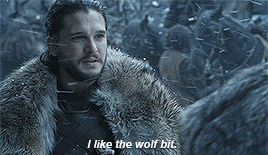
Nice try though!
How does Jon respond to Davos’ appraisal? Does he get flustered that he’s been found out? Does he reject it outright as a vile falsehood?
Jon: There’s no time for that.
And here I must ask again: what do the words that Jon ejects from his mouth mean?!? Does he use the excuse of the white walkers to hide his secret attraction? Does he mean it literally? Is Dany like the Flash, so quick there’s no time to look at her cleavage? Or is he letting out his frustration at having to play out this parody while the world is on the verge of annihilation, as the political!jon theory would support?
The point is we don’t know. We can claw each other’s eyes out over this all we want. The line is left vague for a reason. We, unlike Jon for once, know nothing.
Then we get to Missandei’s speech. She’s essentially the Pope of Daenerism. The main message of her speech is
Missandei: My queen has a good heart
Great. So why did we need this scene again?!? So Jon could find out what he already said he knew? Maybe he needed some reinforcement. What was his reaction to Missandei’s ode, you ask?
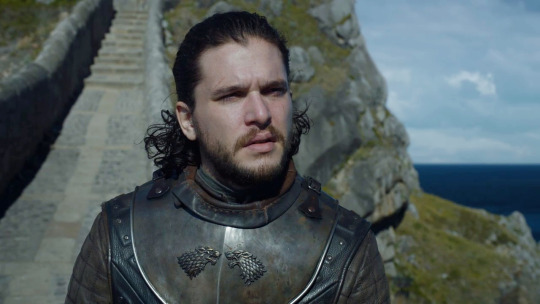
Can’t read my … can’t read my … nobody can read my poker face …
Followed by the old, faithful romantic classic
Jon: Is that a Greyjoy ship?!?
So … a 2 min scene of writers trolling and an aerial shot of a ship … and absolutely no progress on the romance front. No wonder this scene is frustrating.
Humor me for a moment and imagine this scene in a different sequence.Move Missandei’s speech in the beginning and end the scene with Jon saying Dany has a good heart. Eliminate the ship altogether. Doesn’t it feel like a better set-up and make the scene less repetitive and more romantic?
Scene 8:
youtube
The first part of this scene is breathtaking. Leaving aside everything else, it’s astounding to see how far television has gotten in terms of what they can present on screen. Everything from the CGI, to the scope of the shot, to the colors, music and scenery is stunning. It’s perhaps the most memorable moment of the entire season. Plot wise, it’s also extremely meaningful.
Because of the stunning imagery, this has led people to interpret it as romantic in nature. But it isn’t. This is not about the Jon/Dany romance at all, but rather about R+L=J, about Jon himself and his nature. We’ve never seen another person apart from Dany get so close to Drogon before, let alone pet him. And all this is punctuated by Kit Harrington playing Jon as completely overwhelmed. As he should be. He’s doing something that people haven’t been able to do for 300 years and, more importantly than that, he’s doing something that feels strangely familiar to him.
That’s why all those gif sets showing Jon as completely in awe that imply he’s looking at Dany are so frustrating. Watch this scene again and you’ll see that he’s holding eye contact with Drogon throughout, punctuated even by a close-up of the dragon’s eye looking at Jon. It’s only Dany that looks at him curiously, seeing him interact with her favorite pet/child.
If you’re going to frame those looks as romantic in nature, you shouldn’t be shipping Jonerys at all but rather … Jonon? Drojon? Can’t decide …
So, if we eliminate this first part, and concentrate solely on Jon and Dany’s conversation, what happens?
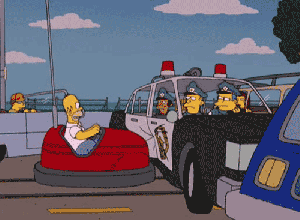
They disagree on whether fire breathing lizards are beautiful, gorgeous, beasts or children.
Dany: They are not beasts to me. They are my children.

Jon’s face says it all really … (gif courtesy of @thelawyerthatwaspromised)
No resolution is reached on this front. So Jon abruptly changes the subject.
Like I said in my previous post, romantic couples don’t reach this type of communicational impasses. They duke it out to the end or reach common ground. That’s what makes them work.
But it gets worse. Not even the awkward transition to another subject leads to anything.
Jon: You weren’t gone long.
Dany: No.
Jon: And?
Dany: And I have fewer enemies today than I did yesterday.
Silence … Very awkward silence … Dany literally has to push the conversation forward and …
Dany: You don’t know how you feel about that
Jon: No, I don’t
…it still doesn’t go anywhere. The writers keep breaking the momentum of their dialogue over and over again and frustrating both Dany and the audience.
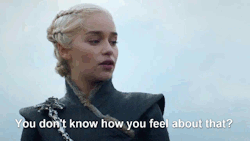
Just look at that face. That’s the face I pull every time I come back home from a bad date.
But Dany is a stubborn girl. She tries again, with another awkward change of subject.
Dany: When you first came here, Ser Davos said you took a knife to the heart for your people.
Jon: Ser Davos gets carried away.
This would have been the perfect time for Jon to open up, at least a little bit. He thinks she has a good heart after all, right? But no. He not only avoids the subject, he lies outright. Why? Why would he lie? And more importantly why do the writers want to keep Dany at arm’s length from Jon this far into their relationship?
Dany doesn’t completely believe him but have no fear!
Luckily the plot intervenes before Jon is forced to answer. Heaven forbid that we get a meaningful conversation between 2 people that are about to have sex a few scenes from now. The less 2 people talk, share their feelings and experiences, the more impactful their romance is. Isn’t that how it goes?
The introduction of Jorah in this scene is significant because the dreaded competitor for the maiden’s heart is a trope used to excess in romantic plots.
No matter that the writers haven’t built up enough of a connection between Jon and Dany for us to feel the stakes of introducing this new element into their romance. Finally, now we have the opportunity to see Jon look jealous and feel that his bond to Dany is threatened by someone with whom she shares so much history. Sure he might be standoffish and cryptic when it’s just the two of them but surely he won’t be able to control himself when he sees his lady love hug another man. So what do you say, Jon?
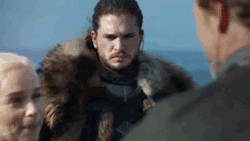
P p p poker face, p p p poker face
Scene 9:
youtube
I won’t analyze this entire scene because most of it is not linked to the romantic subplot and also … it’s stupid. The whole hunt plot is stupid and Tyrion should lay off the bottle immediately. It’s affecting his intellectual skills.
We will resume ourselved to the 3 romantic beats withing the scene.
So, we start promisingly enough with Jon letting everyone know that Arya and Bran are alive. There’s no context as to why he decided to announce this in front of a room of strangers so read into that what you will. Perhaps he wanted to share the happy news with Dany …
Dany: I’m happy for you
Silence
Dany: You don’t look happy.
Silence
Perhaps we could tell from his expression?
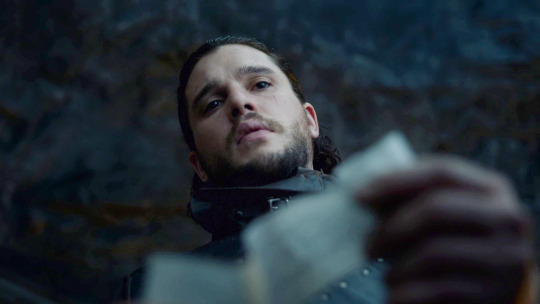
Lady Gaga ran out of lyrics, you guys … sorry about that …
End of topic. No need to explore this momentous event for Jon or have the opportunity to see him sharing his happiness with the love of his life. That’s what fanfiction is for.
Then there’s the part when Jorah offers to hunt down a zombie to bring back as trophy for his heart’s desire. This has, of course, prompted people to speculate that Jon decides to go on the hunt in order to one up him in Dany’s eyes. Which is not outlandish, per se. That’s what happens in a love triangle after all.
However there are two issues with this.
One - there is absolutely no one in the audience that thought Jon would not go on this hunt since the moment it was proposed. He was Lord Commander of the Night’s Watch, he’s the only one in that room who has gone beyond the wall and the only one who has actually fought the army of the dead. Jorah or no Jorah, the scene would have ended with Jon going on the hunt. That sort of undercuts the whole jealousy angle.
Secondly there’s this peculiar sequence of lines after Jorah says he’ll go:
Jon: The free folk will help us
Davos: They won’t follow Ser Jorah.
Surely, if jealousy was what the writers were going for, those two lines should have been inversed. That could be construed as an attack on Jorah’s abilities by Jon and could lead to a starring context between the two, right before they’d take their shirts off and duke it out in the rain while Dany watches in rapture from the window.
Does that sound like a ridiculous, over the top, infantile scenario? Sure … But let’s make one thing very clear. Writers do not introduce romantic triangles into stories because they want to keep it classy. They introduce it so that at some point we can end up here:
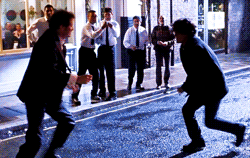
The last of the romantic plot in the scene comes right after Jon says he’ll go on the hunt.
Dany: I haven’t given you permission to leave.
This line pulls double duty in terms of plotting. It just does it in the wrong direction. On one hand, it torpedoes the love triangle because Dany clearly doesn’t want to let Jon go while she doesn’t have that many qualms about Jorah potentially freezing to death or getting killed. So with 8 words a triangle that started a scene ago has been turned back to a straight line for the audience. That’s no way to build up tension between your characters.
The second thing it does is that it shows, once again, just how one sided this whole relationship is. Because Jon is not at all touched by Dany’s concern for his well-being.
In fact he seems rather annoyed by her attempt.
Jon: With all due respect, your Grace, I don’t need your permission. I am a King.
This has been described as a ‘panty dropping’ line. Except that depending on where your alligencies lie, the interpretation for why it pulverizes underwear is different. People that are invested in this ship say that this is the moment Jon proved himself a good King to Dany. People that reject this ship see it as the moment when Jon regains his agency and status, after being humiliated by not only the queen, but also her servant when denied his rightful title.
Again, this is a problem. Because you shouldn’t have two contradictory explanations for one line this late in the plot. By this point we should all agree on the basic meaning behind what Jon says, whether we like the pairing or not.
Also:
Jon: I put my trust in you … a stranger […] Now I’m asking you to trust in a stranger.
We end this scene with Jon calling the two of them ‘strangers’. It kind of feels like we’ve been through 9 scenes and three episodes of romantic build-up and we have nothing to show for it.
Scene 10:
youtube
This scene has been analyzed a lot so I won’t dwell too much on it. The reason why it’s gotten so much interest is because of the ‘look back’ trope.
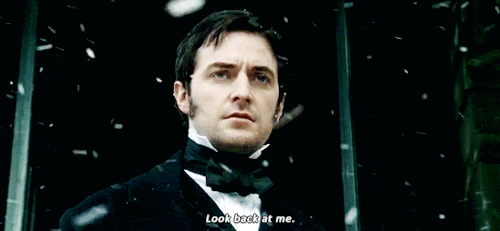
Jon not looking back is not, in and of itself, a problem. In isolation, it can be seen as a missed opportunity on the writers’ part. Adding the fact that Dany does follow him with her eyes for quite a bit just like the lovely John Thornton does with Margaret Hale in the gif above, does put a blemish on the whole thing.
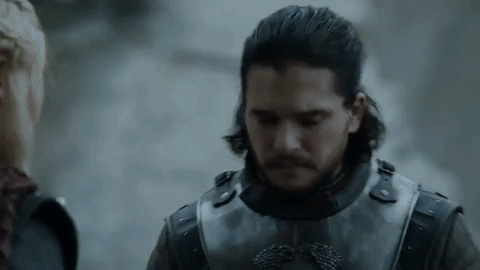
But then the writers for some reason double down on this motif by having Jorah look back at Dany. And then the camera also includes Jon pointedly NOT looking back.
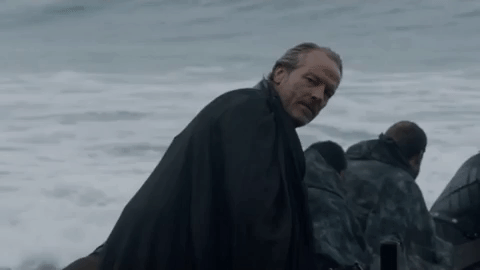
Look at the boy go … It’s like he’s trying out for the Forest Gump remake. Run, Jon, run!
Once you put all of these elements together in one scene it becomes less of a frustrating lack of romantic fulfillment and more of an intentional message that is very hard to ignore.
But let’s leave that to the side and talk about their last words to each other.
Jon: If I don’t return, at least you won’t have to deal with the King in the North anymore
Dany: I’ve grown used to him
Jon: I wish you good fortune in the wars to come, Your Grace
I’ve already pointed out in my first post of the series how deeply unwise it would be to have Jon say good-bye to Dany by using Mance Rayder’s last words to Stannis if we were to look at this scene in a romantic way.
It isn’t just the fact that Stannis and Mance were enemies. It’s also problematic because Mance was on his way to being burned alive for not bending the knee. Fire is something that the audience connects to Dany immediately. And what was the main bone of contention for these 2 characters throughout Jon’s stay on the island?
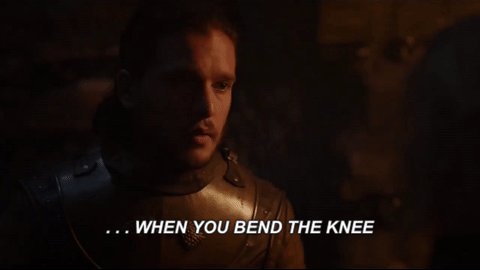
Aside from that, the dynamic between them is exactly the same. Dany’s attempt at warmth and intimacy is flanked by two general, formal statements by Jon, the first of which is actually a bit passive-aggressive if you remember that Dany requested he bend the knee so she could name him Warden of the North.
Also, this is put in direct contrast with the way Jorah says good-bye to her.
Dany: We should be better at saying farewell by now.
Jorah: Your Grace, I …
Jorah’s line is interrupted by Dany grabbing his hands. This touch elicits such a powerful emotional response from him that he can’t continue his train of thought. He simply bends his head and kisses her hand.
If you were saying good-bye to someone you love, which one of these two responses would feel more bitter-sweet and romantic? Which one would you like to receive?
If you say Jon’s …. Well then:
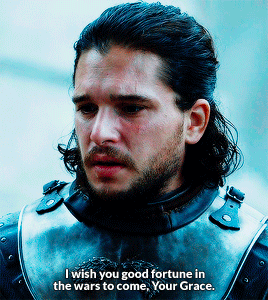
(source: @dreamofspring)
Thank you guys so much for all your great feed-back and a special thank you to @thelawyerthatwaspromised for supplying me with some of the gifs in this post. They were a life saver. The rest of the gifs and clips also do not belong to me. I picked them up from all over the place so if you recognize your work, let me know and I will add the source below the pic. Thank you!
Also:

stay tuned for part 4
337 notes
·
View notes
Text
Salmon Run and Presentation
A (not so) brief dissertation on narrative framing in video games, featuring Splatoon 2
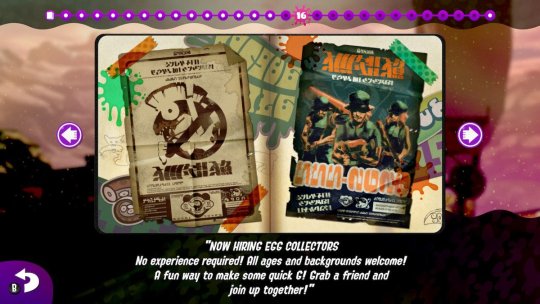
With the holidays in full swing, I took advantage of a deal one day when I went into town, and finally got my hands on Splatoon 2. Having loved the prior game as much as I did, waiting this long to get the sequel felt almost wrong. But like many another fellow meandering corpus of conscious flesh, I am made neither of time nor money.
Finally diving in, I figured I might take this excuse to remember that I write game reviews, sometimes. You know, when the tide is high, the moon blue, and the writer slightly less depressed. I ended up scrapping my first couple drafts, however. You see, a funny thing was happening; I kept veering back into talking about Salmon Run, the new optional game mode the sequel introduces.
Also I might look at the Octo Expansion later, on its own. After I get around to it…
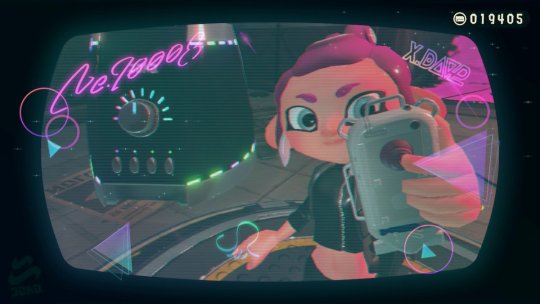
Look, the base game already has a lot of content to explore, and as previously stated, I am sadly corporeal, and not strung together with the metaphysical concept of time itself.
My overall thoughts, however, proved brief, so I’ll try to keep this short.
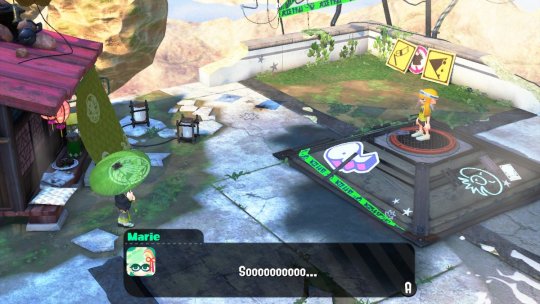
(Mild spoilers coming along.)
Gameplay wise, I think the story mode is much improved upon by handing you different weapons for certain levels which were specifically built with them in mind. Whereas the prior game left you stuck with a variant of the starter splattershot all the way through. This keeps things interesting, pushes me outside of my comfort zone, and it’s a good way to make sure players will come from a well-informed place when deciding what weapon they want for multiplayer; which, let’s face it, is the real meat of these games and where most players are going to log the most time.
I also love the way bosses are introduced with the heavy drums and rhythmic chants and the dramatic light show. It endows the moment with a fantastic sense of gravitas, and manages to hype me up every time. Then the boss will have an aspect of their design which feels a bit silly or some how rather off, keeping the overall tone heavily grounded in the toony aesthetics the series already established for itself.
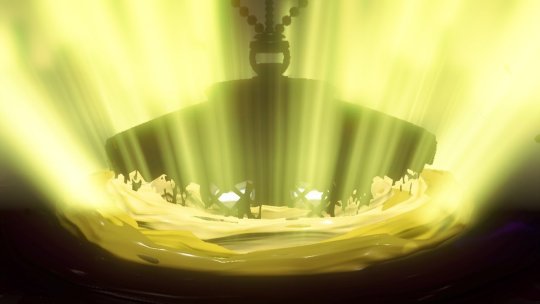
Narratively, I felt rather okay about the story aspect of Story Mode. The collectible pages in the levels still have a certain amount of world building, though this time it seems more skewed toward explaining what pop culture looks like in this world, such as, an allusion to this world’s equivalent to Instagram.
Cynical as it is…
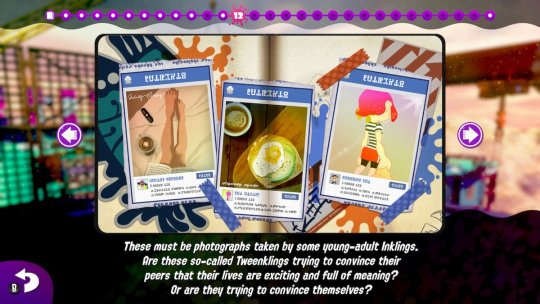
That’s definitely still interesting in its own right, though perhaps it’s less of a revelatory gut-punch as slowly piecing it together that the game takes place in the post-apocalypse of Earth itself, and the inklings copied ancient human culture.
We still got some backstory for this game’s idol duo, though. And that, I appreciate. It means Pearl and Marina still feel like a part of this world, rather than seeming obligatory for the sake of familiarity, given the first game had an idol duo as well.
Meanwhile, perhaps it is a bit obvious that Marie’s cousin, Callie, has gone rogue, and that she is the mysterious entity cracking into the radio transmissions between her and Agent 4. If I recall correctly, that was a working theory that came about with the first trailer or two. That, or she had died.
As soon as Marie says aloud she wonders where Callie has gone, I knew right away. And that’s just in the introduction.
That said, on some level, after stomaching through certain other games and such that actively lie or withhold information to force an arbitrary plot twist for plot twist sake, it feels almost nice to go back to a narrative that actually bothers to foreshadow these things. Plus, having gotten already invested in Callie as a character from the first game, I still felt motivated to see the story through to find out why she went rogue. And, loving the Squid Sisters already, there was a hope in me that she could be redeemed, or at least understood. In terms of building off the prior game’s story, Splatoon 2 is moderately decent.
Also, I mean, c’mon. The big narrative drive might be a tad predictable, but hey, this game is for kids. It’s fine.
That, I think, is something I love the most about Splatoon. Despite feeling like you’re playing in a Saturday morning cartoon, and being aimed primarily at children, it doesn’t shy away from fairly heavy subjects. Such as the aforementioned fact that the humans are all long dead and you’re basically playing paintball in the ruins of their consumerist culture.
Which brings me to what fascinates me so much about Splatoon 2: the way in which Salmon Run is framed.
You see, on the surface, Salmon Run appears to be your typical horde mode; a cooperative team (typically comprised of randoms) fights off gaggles of foes as they take turns approaching their base in waves. Pretty standard for online shooters these days, as was modernly popularized by Gears of War 2, and Halo ODST.
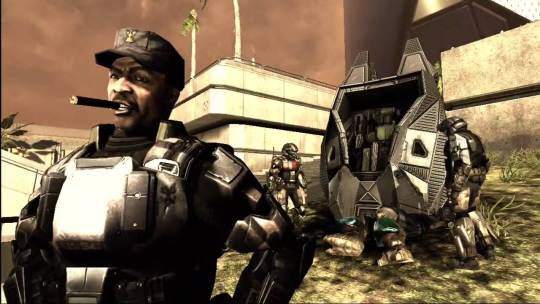
I say “modernly,” as the notion of fighting enemies as they approach in waves is not exactly a new concept for mechanical goals within video games. Rather, the term itself, as applied to multiplayer shooters, “horde mode,” became a point of game discussion when Gears of War 2 introduced the new game mode by that same name back in… 2008?
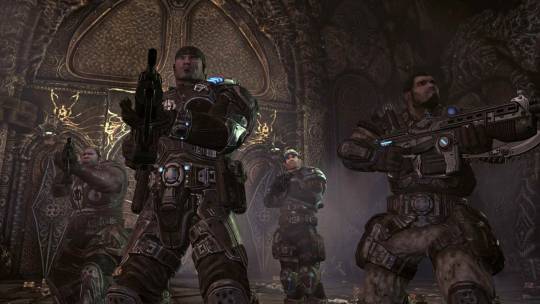
No, no that can’t be right. I played Gears 2 back in high school (I had worse taste back then, okay?). Which, from my perspective, was basically yesterday. That game being ten years old would mean I myself am old now, and that just can’t be. I’m hip. I’m young.
I am, to stay on theme here, fresh.
But okay, existential crises and game talk terms aside, the writing team behind Splatoon 2 probably decided to absolutely flex when it came to the narrative surrounding Salmon Run. It is one of the most gleaming examples of the nontraditional things you can do with writing in video games, to really elevate the experience.
Let me explain.
You see, narrative in video games typically falls into one of two categories: either the story sits comfortably inside of the game, utilizing it like a vehicle to arrive at the destination that is its audience’s waiting eyes and ears. Or the narrative, on some level, exists rather nebulously, primarily to provide something resembling context for why the pixels look the way they do, and why the goals are what they are.
Not to say this is a binary state of existence for game writing; narrative will of course always provide context for characters, should there be any. It’s primarily older, or retro games that give you a pamphlet or brief intro with little in the way of worrying over character motivation, and the deeper philosophical implications of the plot, etc (though not for lack of trying). These would be your classic Mario Bros. and what have you, where the actual game part of the video game is nearly all there is to explore in the overall experience.
Then you have games like Hotline Miami that purposely sets up shop right in the middle to make a meta commentary about the state of game narrative, using the ideological endpoint of violent 80’s era action and revenge-fantasy genre film as inspiration and the starting point to draw comparison between the two. It’s bizarre, and I could drone on about this topic.
But I digress.
Despite falling into that latter category, that is to say having mainly just an introduction to the narrative context so you can get on with playing the game, Salmon Run is a stellar example of how you can make every bit of that context count (even if it does require the added context of the rest of the game, sort of, which I’ll explain, trust me).
First, a (very) brief explanation of how the game itself works, for the maybe three of you who haven’t played it yet.
A team of up to four inklings (and/or octolings) have a small island out in open waters. Salmonid enemies storm the beaches from various angles in waves. Each wave also comes with (at least) one of eight unique boss variants, who all drop three golden eggs upon defeat. Players are tasked with gathering a number of said golden eggs each round, for three rounds, after which their failure or success in doing so shows slow or fast progress towards in-game rewards.
And it’s all an allegory for the poor treatment of labor/workers, utilizing the fishing industry as both an example and a thematically appropriate analogue. Yes, I’m serious.
First, Salmon Run is not available through the main doors like the other multiplayer modes. Rather, it is off to the side, down a dingy looking alley. And when you’re shown its location, either because you finally entered the Inkopolis plaza for the first time, or because the mode has entered rotation again, Marina very expressly describes it as a job.
A job you should only do if you are absolutely, desperately hard strapped for cash. You know, the sort of job you turn to if, for one reason or another, you can’t find a better one.
An aside: technically, playing Salmon Run does not automatically net you in-game currency, with which to buy things, as regular multiplayer modes do. Rather, your “pay” is a gauge you fill by playing, which comes with reward drops at certain thresholds; some randomized gacha style capsules, and one specific piece of gear which gets advertised, to incentivize playing.
The capsules themselves drop actual paychecks in the form of aforementioned currency, or meal tickets to get temporary buffs that help you progress in the multiplayer faster via one way or another. Which, hey, you know, that helps you earn more money also. Working to get “paid,” so you can get things you want, though, still works perfectly for the metaphor it creates.
When I first saw it open up for rotation, I found out you had to be at least a level four to participate. Pretty par for the course, considering it’s the same deal with the gear shops. But, again, it’s all in the presentation; Mr. Grizz does not simply say something akin to the usual “you must be this tall to ride.” He says he cannot hire inexperienced inklings such as yourself, because it’s a legal liability.
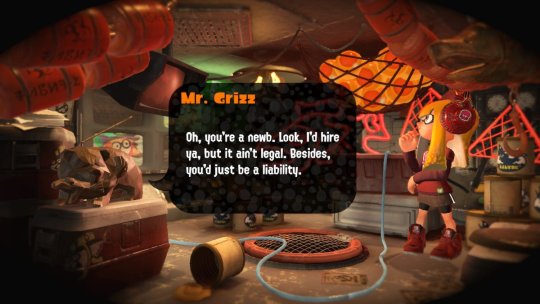
After returning with three extra levels, I was handed off to basic, on-the-job training. Which is only offered after Mr. Grizz (not ever physically present, mind you, but communicating with you via radio), the head of Grizzco, uses fairly typical hard sell rhetoric when it comes to dangerous, or otherwise undesirable work: calls you kid, talks about shaping the future and making the world a better place, refers to new hires as “fresh young talent,” says you’ll be “a part of something bigger than yourself.” You know, the usual balancing act of flattery, with just the right amount of belittlement.
Whoa, hang on, sorry; just had a bad case of deja vu from when the recruiter that worked with the ROTC back in high school tried to get me to enlist… several times… Guess he saw the hippie glasses and long hair and figured I'd be a gratifying challenge.
The fisher imagery really kicks in when you play. Which, I figure a dev team working out of Japan might have a pretty decent frame of reference for that. A boat whisks you out to sea with your team, and everyone’s given a matching uniform involving a bright orange jumper, and rubber boots and gloves. If you've ever seen the viral video of the fisherman up to his waist in water telling you not to give up, you have a rough idea. Oh, and don't forget your official Grizzco trademark hats.
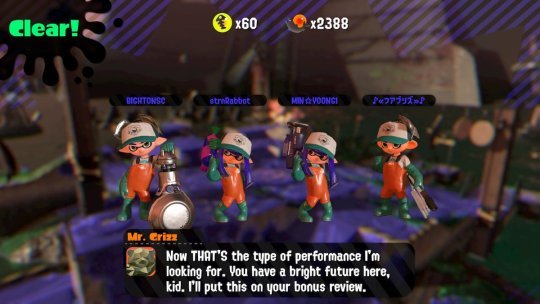
It’s on the job itself where a lot of what I'm talking about comes up the most; that is to say, despite buttering you up initially, Mr. Grizz shows his true colors pretty quickly. While playing, he seems to only be concerned with egg collecting, even when his employees are actively hurting. This is established and compounded by his dialogue prior to the intermediate training level, in which informs you about the various boss fish.
Before you can do anything remotely risky, even boss salmonid training, Mr. Grizz tells you he has to go over this 338 page workplace health and safety manual with you. But, oops, the new hire boat sounds the horn as you flip to page 1, so he sends you off unprepared. “Let’s just say you’ve read it,” he tells you, insisting that learning by doing is best.
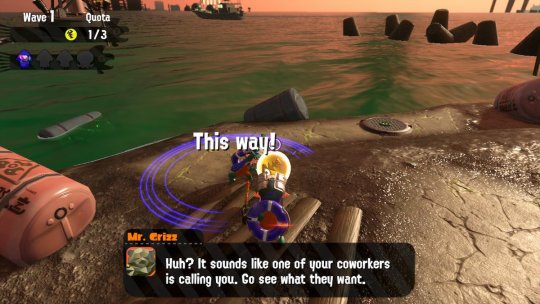
This flagrant disregard employee safety, in the name of met quotas; the fact we never see Mr. Grizz face to face, making him this vague presence that presides over you, evaluating your stressed performance with condescension; that we are not simply given the rewards as we pass thresholds to earn them, having to instead speak with another, unknown npc for our pay… It all drives toward the point so well.
The icing on the cake for me is when a match ends. You, the player, are not asked if you’d like to go back into matchmaking for another fun round of playtime. Rather, you are asked if you would like to “work another shift.”
The pieces all fit so well together. I shouldn’t be surprised that, once a theme is chosen, Splatoon can stick to it like my hand to rubber cement that one time. It has already proven it can do that much for sure. But it’s just so… funny? It’s bitterly, cynically hilarious.
Bless the individual(s) who sat in front of their keyboard, staring at the early script drafts, and asked aloud if they were really about to turn Mr. Grizz into a projection of all the worst aspects of the awful bosses they’ve had to deal with in life. The answer to that question being “yes” has led to some of my favorite writing in a video game.
All of these thoughts, as they started forming in my skull, really began to bubble when I noticed Salmon Run shifts become available during my first Splatfest.
Splatfest is, to try and put it in realistic terms, basically a huge, celebratory sporting event. Participation nets you a free commemorative t-shirt and access to a pumping concert featuring some of the hottest artists currently gracing the Inkopolis charts.
The idea, the notion, that a hip young inkling (or octoling) might miss out on one of the biggest parties of the year because they need money more than they need fun? It’s downright depressing.
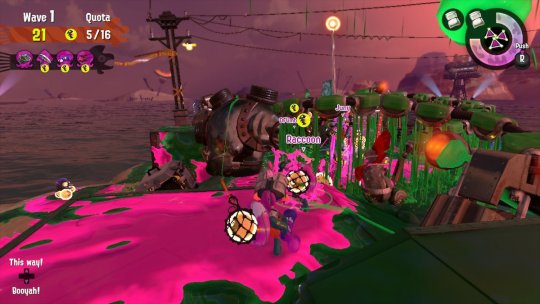
It got me thinking. I looked at my fellow egg collectors. In-universe, we were a bunch of teen-to-young-adult aged denizens missing out on all the fun because we desperately needed the cash. We became stressed together, overworked together, yelled at by our boss together. But in those sweetest victories, where we’d far surpassed our quota? We celebrated together.
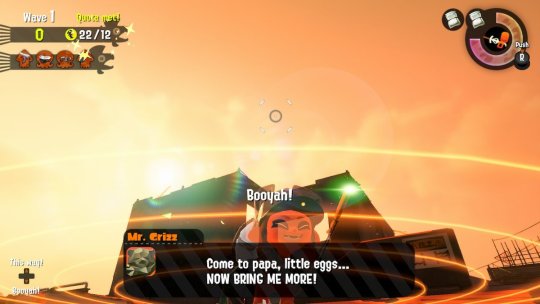
Spam-crouching, and mashing the taunt, something changed. I felt a greater sense of comradery with these squids and octos than I did in nearly any other coop game. And it’s all thanks to the rhetorical framing of the game mode.
It accomplishes so many things. It’s world building which wholistically immerses you in the setting. But mainly, its dedication to highly specific word choice does exactly what I mentioned earlier: it elevates the experience to one I could really sit down and think about, rather than use to while away the hours, then move on to something else. So many games make horde modes that feel inconsequential like that; it’s just for fun.
There’s nothing wrong with fun being the only mission statement for a game, or an optional mode of play. But this is exactly what I mean when I say this is the nontraditional writing games can do so much more with. And Splatoon 2 saw that opportunity, and took it. And what a fantastic example of bittersweet, cold reality, in this, a bright, colorful game meant mainly for children…
Happy Holidays, everyone!
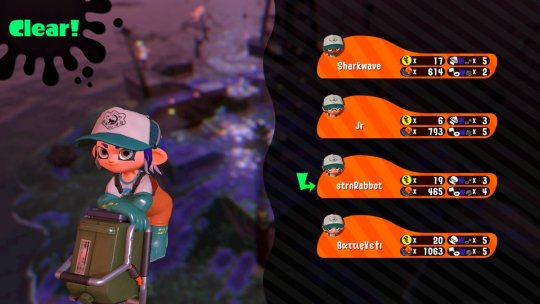
21 notes
·
View notes
Text
‘Black Mirror’ Season 4 Episodes: Charlie Brooker and Annabel Jones Interview [Spoilers]
http://styleveryday.com/2017/09/03/black-mirror-season-4-episodes-charlie-brooker-and-annabel-jones-interview-spoilers/
‘Black Mirror’ Season 4 Episodes: Charlie Brooker and Annabel Jones Interview [Spoilers]
Black Mirror viewers were thrown for a loop when the third season of the horror anthology series delivered a happy ending.
The season three episode, “San Junipero,” became an instant cultural phenomenon and nabbed creator Charlie Brooker two Emmy nominations for standing out among an otherwise tantalizingly bleak universe of techno-paranoia. The 1987 California-set episode — with its neon palette, nostalgic soundtrack and oceanside optimism — came at the perfect time and in the wake of both the U.S. presidential election and Brexit. Brooker, who along with executive producer Annabel Jones, brought his BBC dystopian series to Netflix with the six-episode third season in late October 2016.
“It was the first episode I wrote for season three and it was a conscious effort to blow up what I thought a Black Mirror episode was,” Brooker told The Hollywood Reporter during a recent sit-down with Jones. The pair stressed that if nothing else, their intent is always to deliver the unpredictable.
Throughout its three-season run, Black Mirror has delivered twist after shock ending, with much to say about society layered between. The series launched with a commentary on social media that saw a U.K prime minister having sex with a pig on live television. The episode, “The National Anthem,” is now fondly known as #piggate among the Black Mirror audience. Brooker writes every script and among the 13 episodes, many of his seemingly far-fetched ideas — from apps to VR to personal tracking technologies — have later made headlines for being in development. Most notably, however, he foreshadowed the rise of President Trump with 2013’s “The Waldo Moment,” which saw an outsider who voices a cartoon bear winning an election by utilizing anti-establishment rhetoric.
The highly anticipated fourth season, which doesn’t yet have a premiere date but is set to launch on Netflix later this year, recently released its cryptic episode titles, cast and directors. Among the group, Jodie Foster will direct an episode starring Rosemarie Dewitt and Fargo stars Jesse Plemons and Cristin Milioti, along with Westworld‘s Jimmi Simpson, join the roster. Past cycles have starred Jon Hamm, Bryce Dallas Howard, Michael Kelly, Wyatt Russell, Kelly Macdonald, Domhnall Gleeson, Daniel Kaluuya, Gugu Mbatha-Raw and Mackenzie Davis, to name a few.
In the conversational chat below, Brooker and Jones take THR through the method of their madness when it came to plotting the new season (which finished shooting its six episodes ahead of summer), weigh in on the call for a “San Junipero” sequel and whether or not it inspired them to infuse more optimism in season four, and reveal if all those Black Mirror Easter eggs hold any weight. The duo also calls the upcoming season their most ambitious yet, tackling new worlds, tones, themes and episode lengths to create “timeless” stories — whether they end up predicting the end of days or not.
“San Junipero” ranks as both a critical and fan hit. I spoke with the episode’s director, Owen Harris, and we mused about ways San Junipero could be revisited in the future. Have you thought about a sequel or any crossovers?
Charlie Brooker: We’ve thought about it. There were aspects of the story that I took out. For instance, I’d originally written a scene where Gugu’s character, Kelly, is in a kindergarten and there are children there and when you realize what’s going on, it’s that these are deceased children. It was too sad and too poignant of a note to hit in that story, but I kept thinking about how that felt like a whole world in and of itself. I think we almost might do it in a completely different form if we were doing a straight sequel, if that makes sense. Maybe not even as a normal episode.
Like a standalone episode?
Brooker: Like a thing. An experience.
Annabel Jones: Like, for real.
Brooker: That’s exactly what I was going to say. We should do it for real. (Laughs.) We do like to drop Easter eggs every so often in other episodes, so we may be referring to San Junipero again. It’s difficult because I don’t think we’d revisit those characters. That felt like such a story and we wouldn’t want to open it up again.
The episode had a surprisingly happy ending, the first ever for a Black Mirror episode. Why?
Jones: There were a few bumps along the way, and a few question marks and sacrifices. [Kelly] is not whole-heartedly saying, “This is everything I want for the future.”
Brooker: It’s not Rainbow Island. It’s not perfect. It’s been very gratifying how people have taken that episode to heart, though.
The season and that episode came out shortly after the U.S. election and not long after Brexit. Do you think the optimism of the story contrasting with reality is what made it such a fast favorite? There were T-shirts and San Junipero Easter eggs in other TV shows.
Brooker: We saw a reference in The CW’s Riverdale, where a character gets on a bus to go to San Junipero. And there was a reference in a Saturday Night Live sketch. That sort of thing is quite daunting and quite eerie.
Jones: One of the things about being a Netflix show is that you’re not quite sure of the cultural impact of things, or when it will pick up momentum.
Brooker: We had started seeing fan art, all things that we love. And there was a guy who was doing comic book covers who we actually roped into do some stuff on the next season. It’s been interesting. When writing that episode, I was quite nervous because it had a different tone. Because I saw people moaning that the show was going to Netflix and was going to get all Americanized, I said, “Okay. Set it in California.” We also set ourselves the challenge of doing a period episode and I was nervous because it was ultimately a love story between two women — and I’m sitting there in London, a 40-something guy thinking, “Can I pull this off? I don’t know!” So I was relieved to have gotten away with it and then gratified that people took it to heart and that it resonated.
Jones: It was also an opportunity to show that we, and the show, are not anti-technology. Sometimes people think that the show is completely waving its fist at it. Actually, we all love technology and that’s why we’re making a show about it. We’re just sort of exploring some exaggerated stories .
Brooker: I do think it’s interesting that when someone does a show about the supernatural, no one is asking, “Why do you hate the dead so much? What have you got against ghosts?”
Did the reception of the happy ending influence you when it came to plotting the next season?
Brooker: Yes and no. Certainly, I would say that because it was a departure in tone — the fact that it had an upbeat ending was a way of me resetting what I thought the scripts were — and the fact that that worked definitely had some bearing on where my head is at, script-wise. Looking at the world, it’s hard to know quite how to react because the situation keeps changing every 15 minutes and you don’t know what mindset people are going to be in come when we release the season. So it’s had some bearing. We decide the order of episodes after we finish shooting. When something like that lands really well — and people love or hate all the episodes — but since that one resonated so much, you don’t want to hit the same bell again, even though it’s tempting. We have to be unpredictable with the show. We’re kind of back to doing more different things, again.
Jones: The more episodes that we do, the more we challenge our perception of the show as well and what we’re likely to do. I think that was an, as you say, experiment in whether we can keep that sensibility and have an upbeat ending, so it sort of increases the scope.
Brooker: That was the thing. It’s making sure that every story is idiosyncratic and has its own flavor, but that it still feels like it’s got some Black Mirror DNA, somewhere. That is quite a challenge sometimes and can make it a bit tricky. But that’s part of the fun of the show, is that we blow up the world, basically, at the end of each one.
You have spoken about predicting the rise of Trump but when you wrote this season, Trump had risen. Did that making writing this season different going back to it?
Brooker: That’s a good question. In the U.K. I host a comedy show, Wipe, and I do an annual one where I sum up the year. Because 2016 was so horrible, at one point I rang Annabel up and said, “I’m not going to do it.” For my own mental well-being. Then she reminded me that contractually, I had to.
Jones: Yes, I was a very sympathetic shoulder to cry on: You have to do it, so there!
Brooker: After doing it, the immediate after of having to immerse myself and think about it, I was genuinely depressed for a while. Then I thought, “Oh no, that was character building and I think it was useful.” If it made one more person feel a little sane, then that was worthwhile. It’s slightly different with fiction. When returning to writing, I didn’t know if I wanted to completely immerse myself in nihilistic sequels at the moment when I can get that on the news! So there’s a degree of defiance that creeps in.
Jones: That’s reflective of the human spirit as a whole. People are slightly more politicized at the moment and it’s bringing people more into the political fold more than ever before, so there are always positive stirrings.
Brooker: There’s a determination that is empowering. Things that speak to the precise moment? It’s tricky to know what those are until the dust has settled a little. What we don’t tend to do when coming up with the stories is look at the news or the tech pages. We don’t do that and ask, “What’s our take on this?” That’s all stuff that’s percolating around our heads anyway and I guess it comes out in the scripts. There are probably a few explicit references to a few things, but it’s always going to be oblique.
Jones: Most of the stories are small, personal stories and they’re not overtly political. Or they’re not overtly commenting on corporations or government. It tends to be more about the individual so in that sense, there’s a timeless quality to them.
Brooker: Hopefully.
Many of your episodes have made headlines after the fact. “Hated in the Nation” centered around bee terrorism and there were stories about how that could become a reality shortly after you released the season.
Brooker: After San Junipero, there was a story about a hospice in the U.K. that’s using VR nostalgia therapy for their patients.
Does that challenge you even more when thinking up the next season? Or is the fun of it seeing how close this fantasy world merges with reality?
Brooker: We probably push it even further. I remember when we started doing season three, which was the first Netflix season, I said to myself that people always think we’re predicting the future and that we weren’t this time around. I felt that it was so far-fetched. But then, like you say, robot bees become a thing. So I keep thinking that this next season is pushed even further and there’s no way. But you can bet within five minutes Elon Musk is going to pop up with something. We should basically be in product or app design and should be patenting these things.
Jones: We should have a Black Mirror department that we can head up.
Brooker: Where we just 3D print these things so they pop up and land in your lap at the end of each story. (Laughs.)
There is an avid Reddit subculture that exists around finding and deciphering your Easter eggs.
Brooker: Oh, they’ll love the next season then!
Are you increasing the Easter eggs moving forward?
Brooker: I think it’s fair to say that there is one episode where we’ve just opened up an Easter egg hose and fired away.
Is that just a fun nod to the fans, or are you really connecting all these episodes into one Black Mirror universe? And if so, is there an end game to that?
Brooker: My answer to that has changed, actually. It always used to be that it’s just a bit of fun. But then sometimes we’ve done some things where we did explicitly refer to other episodes. I think the rule is that when a character says something that explicitly refers to something else, it’s canonical. Also, they follow the same dream universe. That’s the other thing that I tend to say. There’s a line in “Hated in the Nation” where someone refers to a crime that happened in “White Bear.”
The Twitter feed in “Hated in the Nation” also referred to the prime minister who had sex with a pig in the series premiere.
Brooker: We love doing that. I love all the product design and UI side of it. We’ll sit there and dissect type face. It’s always about stripping it down. But we write Easter eggs to put in there specifically and sometimes there’s gags for people who press pause.
What about your social media strategy? On the day of the U.S. election, your account was trending for tweeting: No, this isn’t a Black Mirror episode. Are you involved in that strategy and linking it with the personality of the show?
Jones: Netflix handles that and we trust their judgment. It does fit with our show. We were sort of conscious on what that day meant to America and we wouldn’t want to think that Black Mirror was promoting itself off the back of it. They were sensitive and responding to other tweets, so they put something out. I think it’s important to be responsive rather than being opportunistic.
Brooker: They were probably typing it with shaking hands, like everyone was while sort of feeling a bit dizzy and unreal. I think they do a really good job with the social feed, as well as the video that mashed up Orange Is the New Black with the “San Junipero” episode. They came to us and we shipped the neon sign over. We should do more mashups with other shows, that would send the Easter egg people into overdrive.
youtube
Unbreakable Kimmy Schmidt did a crossover with Orange Is the New Black in their last season. Is crossing over within the Netflix universe something that interests you?
Brooker: Well, we’ve had [Kimmy Schmidt star] Jon Hamm!
Jones: I don’t know. I think it’s fun to do in the guise of a trail or a one-off.
Brooker: An interesting mental challenge would be to think about how to work that into a Black Mirror story where it’d be a way of breaking the fourth wall. We’d probably do it where someone finds themselves trapped in House of Cards or something, where they know it’s a fictional show they are trapped in. That’s probably the way we would do it. Talk about having difficulty about stripping reality.
The last season of House of Cards spurred similar questions to your last season, about how the shows predicted reality. Getting you two sets of showrunners together would make for an interesting dinner conversation…
Jones: It would be the bleakest evening ever.
With season four, how did you go about picking your directors and actors and are you getting pitched at this point, have you had to turn people down?
Jones: Oh, we wouldn’t turn anyone down.
Brooker: Well, we would turn down random strangers.
Jones: With the directors, it’s quite different to plan with an anthology show. Charlie is writing all of the scripts and comes up with all of the ideas, so when we start the season, we don’t have our six scripts on the table. We’re often a little last minute, shall we say? So he brings the scripts and tells bits and pieces and then we figure out the director. We respond to the script and find the best director for that episode who responds to the material. There’s lots of ways of interpreting the worlds, so you just want to make sure someone is feeding off the same things that inspired you in that script. Then actors will work with our wonderful casting director in the U.K., Jina Jay.
Brooker: When we did “San Junipero,” Owen Harris had directed a previous episode for us, “Be Right Back,” the other tender episode of the series. So that’s why we thought he’d be a good fit. And he loves ‘80s movies and music. The musical debates we would have on that show. The only song we couldn’t clear on that playlist was a Prince track. You have to clear the songs for 15 years or so because of Netflix and I remember at some point “Girlfriend in a Coma” by The Smiths plays as a little joke for about five seconds before she switches it off and it was an outrageous amount of money! It was like shoveling bank notes into a fire.
Jones: It was indulgent but at the same time, it was so important that we set up that era so it felt different. We felt like we had to do this properly.
Brooker: That was one of the things that was a happy accident. I picked 1987 fairly arbitrarily. In the original draft of the script when Yorkie [Davis] was walking in, there were very specific movie posters that she would see that I specified in the script and I was obsessed with the fact that it would be specific weeks of 1987 on the news. So I was looking at the charts and while I was doing that I made a Spotify 1987 playlist and that Belinda Carlisle track, “Heaven Is a Place on Earth” came up while I was running. I thought, “This is the perfect song to the whole thing!” Then I got panicky in case we couldn’t clear it. I didn’t know what I would have done.
What can you tease about the genres and stories of season four?
Booker: Well we can’t say anything.
Jones: Yes, we can’t. But I would say it’s some of our most ambitious films in the next season. Very exciting. We do take on new genres and some new tones.
Brooker: We’re trying not to repeat ourselves, basically. So it’s different in that we’re tackling worlds, tones, themes and looks we haven’t done before. Durations we haven’t done before. Jodie Foster’s episode has the feeling of an indie movie, I can say that without saying literally anything else.
If you got another season, is the six episode model something you plan to stick to?
Brooker: It’s a good number.
Jones: It puts us just on the cusp of a nervous breakdown, so it’s working! I think even a number seven would just do us in.
Brooker: There’s always a point in the middle of the production where we’ll have four or five of them live at any given point and I’ll be writing a script for the next one while doing rewrites on the previous one. There’s a point in which you go, “I can’t keep all these six stories in my head.”
Jones: But we do.
Brooker: But if it was seven, would our brains pop?
So if Netflix came to you and said they want a 12-episode season, it would be a hard no?
Brooker: I think because I tend to be so obsessive about the script and what can work and not, and that’s one of the things that keeps the tone of the show, even though the variety is quite marked, it probably makes it feel all like one piece. Most of it has come out of here.
You also had a mini-movie with “Hated in the Nation.” Will you continue to push the lengths in season four?
Brooker: It was 75 minutes. We may beat that this season. And we also may massively undercut that. We could keep one on an infinite loop! You could do that on Netflix — make one a Groundhog Day that literally never stops. And disable the “back” button for viewers. That’s something to think about. We did talk to some of the tech people about things we could do. When we were doing “Playtest,” the video game episode, I wanted to do it in nightmare mode where after you watched it once, if you watched it again it was different.
Black Mirror
#4 #Annabel #Black #Brooker #Charlie #Episodes #Interview #Jones #Mirror #Season #Spoilers
1 note
·
View note